Online talk given in August 2021
Sir Vincent Fean was a member of the British Diplomatic Service between 1975 and 2014. His last post was as Consul-General, Jerusalem (2010-14). Before Jerusalem, he was Ambassador to Libya, and previously High Commissioner to Malta.
Sir Vincent Fean:
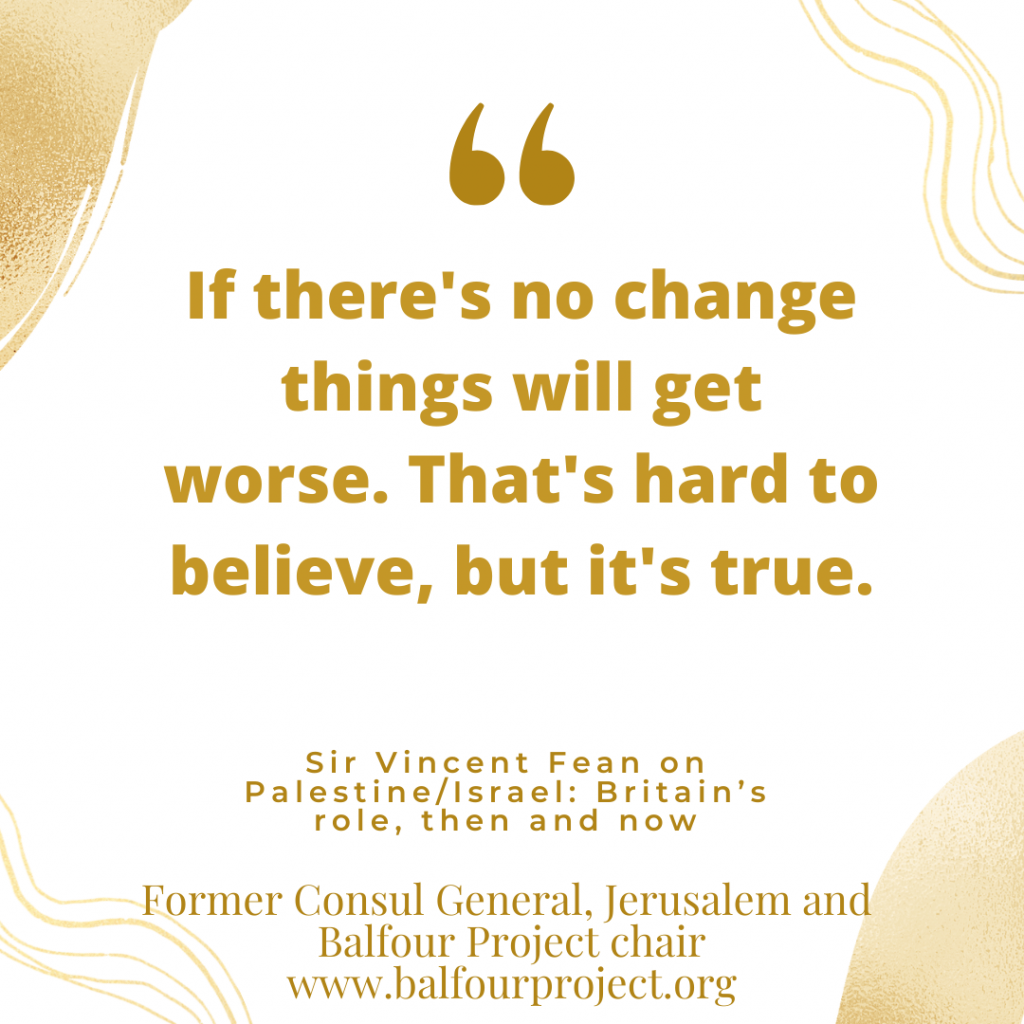
I will begin with what the Balfour Project charity is for, what our aims are, then speak about the history, before and during the time when Britain ran Palestine up to 1948. Then about now: the dire situation on the ground, but more particularly the attitude of our government and civil society to it, the focus more on us than on telling Israel or Palestine what to do. The accent will be on human rights and the rule and law. Finally, the future, and what the Balfour Project and you can do together to change things for the better, because if there’s no change things will get worse. That’s hard to believe, but it’s true.
Aims
First, the aims of the Balfour Project. It’s a charity, which offers both opportunities and constraints. We acknowledge Britain’s historical and continuing responsibilities for what happened, and therefore what happens, in the region. Through popular education, awareness raising and advocacy, we seek to uphold and secure equal rights for the Israeli and Palestinian peoples.
We ask the British Government to recognise the state of Palestine alongside the state of Israel. I repeat, alongside the state of Israel. We wish the best for Israelis and for Palestinians.
The key messages are responsibility – British responsibility – equal rights, and international law.
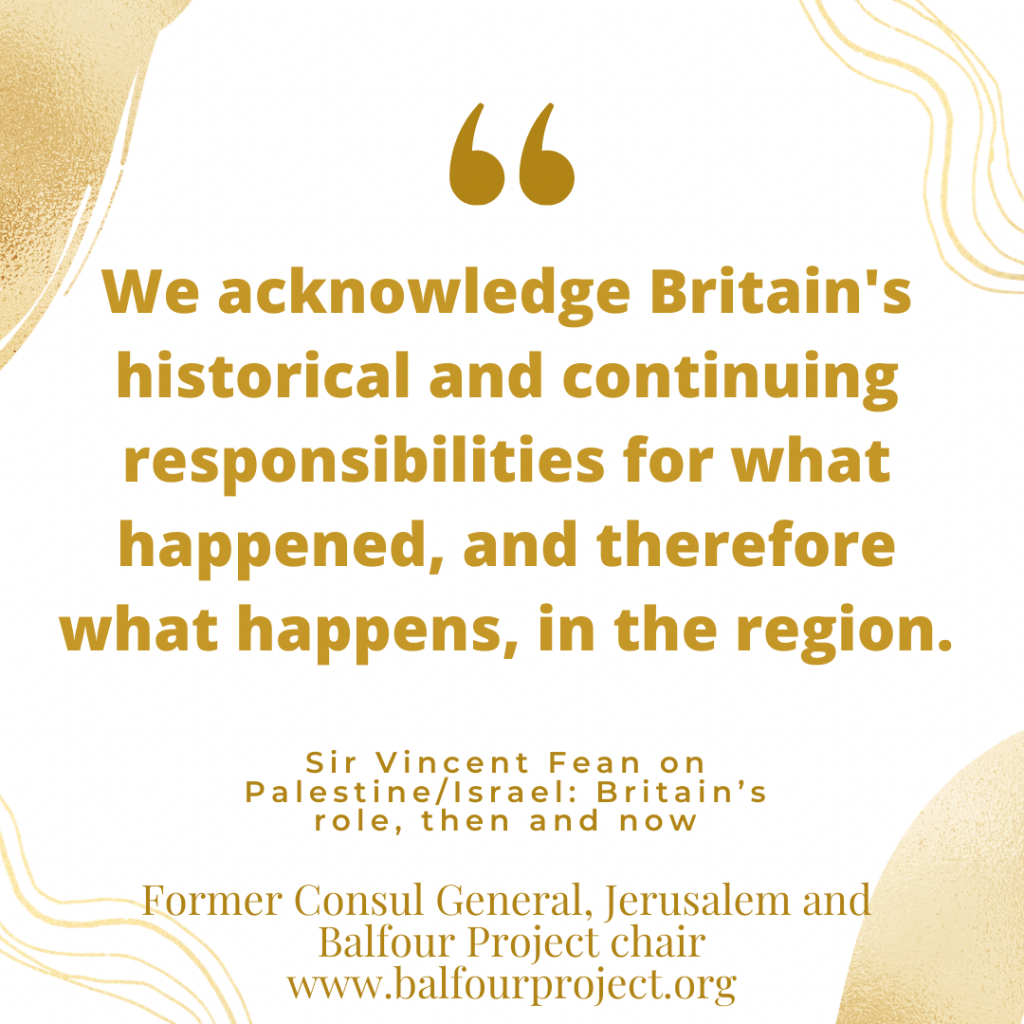
We ask our Government and civil society to understand what the Balfour Declaration and Palestine mean for both Jews and Arabs, and to acknowledge that whilst a homeland for the Jewish people has been achieved, the promise to protect the rights of the Palestinian people has not been kept. We urge the people and elected representatives of the UK to take effective action to promote justice, security and peace for both peoples. There is a self-evident need to end the occupation of June 1967, and to enable the Palestinian people to exercise freely their right to determine their own future. The right of self-determination, including the option of statehood.
The charity believes that reconciliation must come between the peoples of Israel and Palestine, and that it must come on the basis of equal rights.
We’re keen to engage with people in the UK from the three Abrahamic faiths, and also with people of other faiths and none. That covers the multitude.
History
I’m a diplomat, not a historian. I’m going to focus on Britain and will be brief, because I’d like to talk about now and the future more than about the past.
Britain made contradictory promises in World War I and beyond.
In 1915, Sir Henry McMahon, British High Commissioner to Egypt, promised Hussein bin Ali, Sharif of Mecca, an Arab state including Palestine if he rose against the Ottoman Empire. He duly rose. Lawrence of Arabia helped him. That promise was not kept.
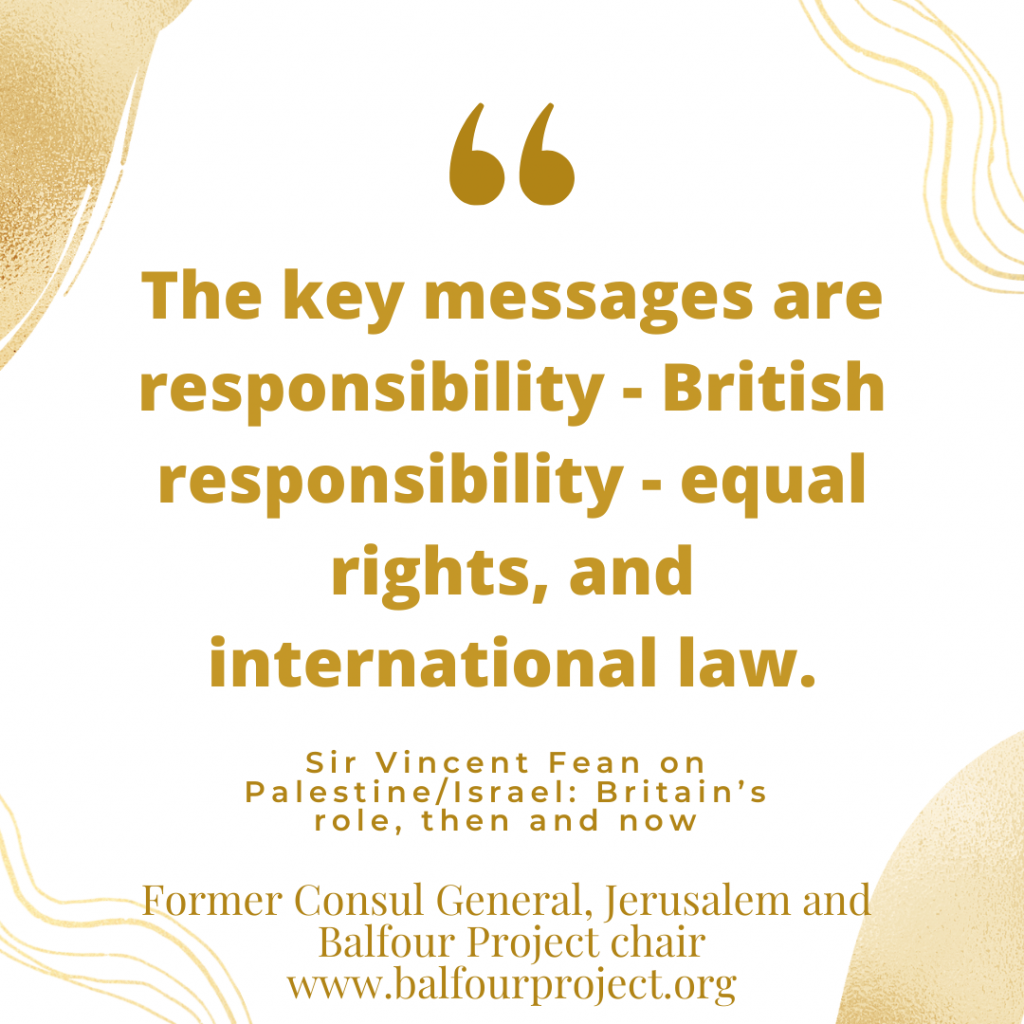
In 1916, there was the Sykes–Picot Agreement, an attempted carve – up of the region between the French and the British, which didn’t last.
Then there was something which did last, the Balfour Declaration of 2 November 1917, which was incorporated into the Mandate that Britain sought and acquired from the League of Nations in 1923. The promise is well-known, so I won’t repeat it, but it’s contradictory. Inherently contradictory.
The Mandate talks about the wellbeing and development of the people of Palestine. It’s worth bearing in mind that in 1917 and 1923, 90% of the population of Palestine was Arab.
And the Mandate talks about a sacred trust of civilisation to help the wellbeing and development of those people.
The Balfour Declaration was incorporated into the Mandate, and that’s also contradictory. Arthur Balfour, the Foreign Secretary of 1917, is on the record as believing that fulfilling that promise was essential, the promise of a homeland for the Jewish people. And the views of the Arab majority were in his mind an obstacle to overcome or bypass. And bypass those Arab majority views, we did.
To quote the late British historian of Israel, Sir Martin Gilbert, in a lecture in Israel in 2011, ‘The centrepiece of British Mandatory policy was the withholding of representative institutions for as long as there was in Palestine an Arab majority’. I believe that to be true.
There are many valid analyses of the reasoning behind UK Government policy in the region in the first half of the 20th century. Here are a few.
Political expediency. Desperation in war and expediency in peacetime.
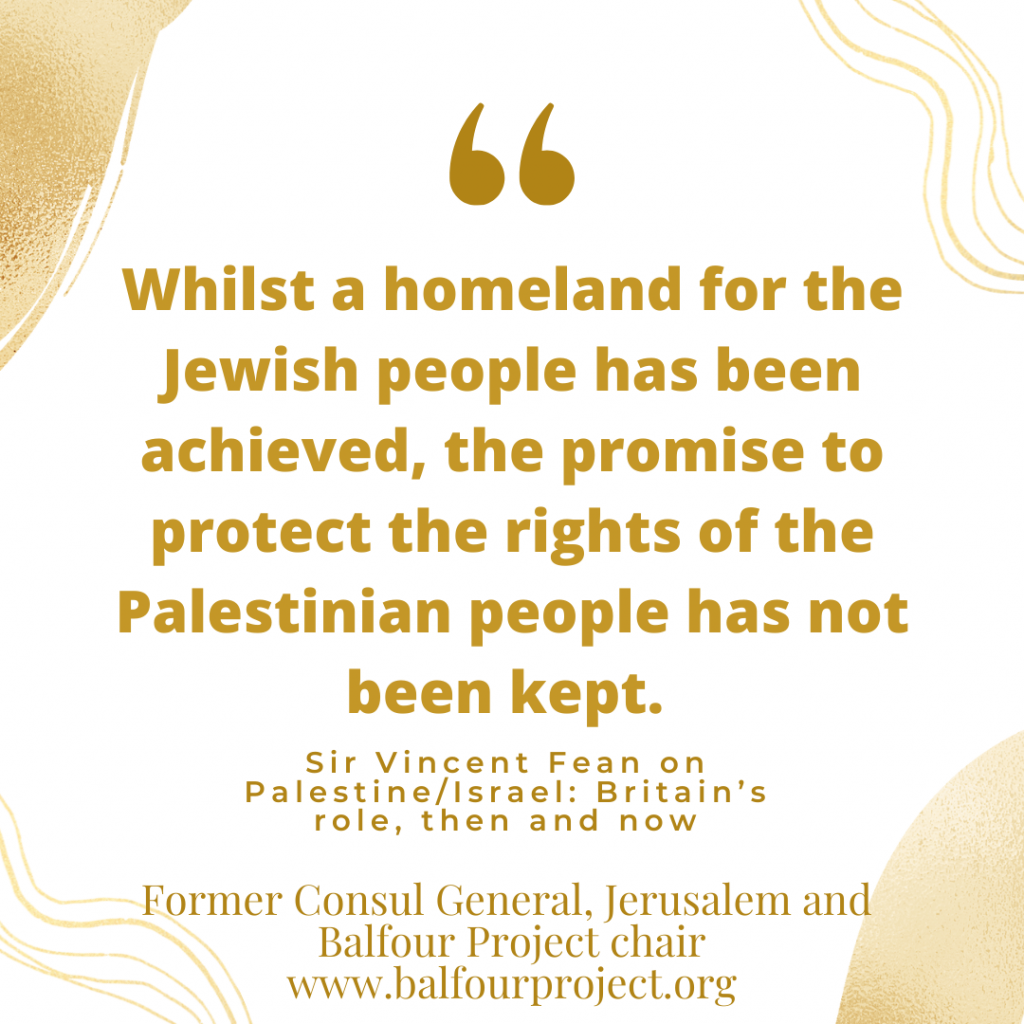
Another is imperial arrogance, somehow to protect the passage to India, Egypt and the Mediterranean.
There’s also the most literal interpretation of the Bible, that God gave this land to the Jews, to the people of Israel. And certainly, some of the First World War UK cabinet were what’s called restorationists, what we might now call Christian Zionists.
I will not dwell on the saga of Britain’s ignominious withdrawal from Palestine in 1948. The story is well-told in many books, including Ian Black‘s book Enemies and Neighbours, covering the hundred years from Balfour on, including the creation of the modern state of Israel in 1948 and the Nakba, or catastrophe, that befell the Palestinians.
I’d like to say a word about the Palestine Police Force, created in 1920 and working until 1948, when it was disbanded. In my opinion the Palestine Police Force, as against the auxiliaries, tried to hold the ring, were let down by their political leaders, and did what they could in very difficult circumstances. I saw the graves of some of those policemen in the Protestant cemetery on Mount Zion, killed in the Camp David Hotel bombing of 1946.

Back to the Nakba. The Nakba is not an episode in history. It is a lived reality today, lived by Palestinians and witnessed by all who have eyes to see and are willing to look.
To anyone who thinks what’s happening now is okay, I say look again.
As we leave history and move on to now, may I pause on November 1967, and UN Security Council Resolution 242. Drafted by the UK, agreed unanimously five months after the June War, it condemns acquiring territory by force and calls for Israel to withdraw from territories occupied. Yet the occupation of 1967 continues today. Gaza, East Jerusalem, and the rest of the West Bank. Abnormal, but it’s become the norm.
Resolutions come and go. 242. 338. In 2016, 2334. There is a long list of resolutions. The failure to implement them is chronic and undermines the genuine importance of international law, which was the focus of the latest Balfour Project Conference in May this year. More on that later.
Now
I come to now and Britain’s role – both Government and civil society.
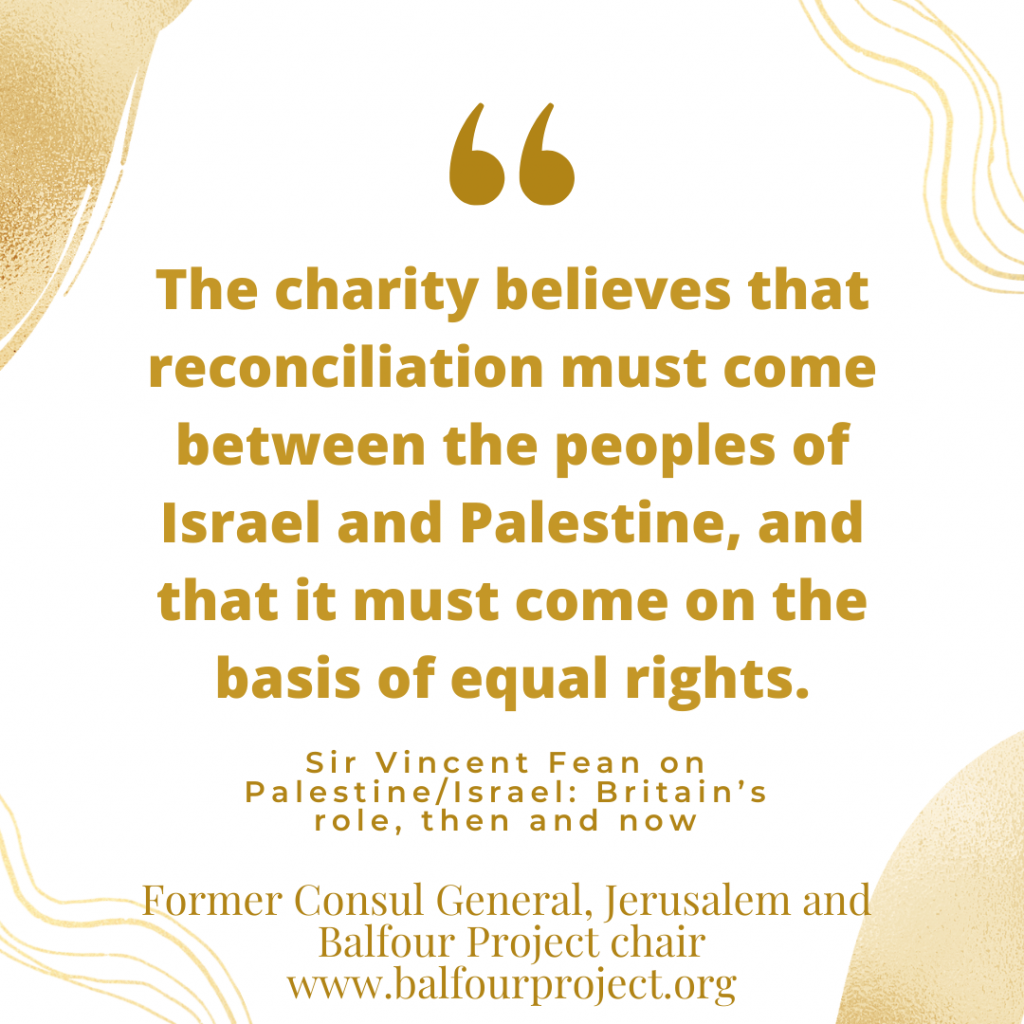
I gave a talk on this theme in April 2020, and I looked back at it as I worked on this one.
Then, I gave our British Government credit for some things. For example, substantial funding of the UN Relief Works Agency and even the Palestinian Authority. After my talk, and not because of it, Boris Johnson voiced his opposition to Mr. Netanyahu’s then planned formal annexation of parts of the West Bank.
In my talk, I also criticised Mr. Johnson for his policy of appeasement towards President Trump and Trump’s Deal of the Century. Appeasement which involved finding value in the deal where there was none.
Where are we now in terms of British Government policy? Judge for yourself.
UK funding for UNRWA and the Palestinian Authority – slashed. The crass letter from Mr. Johnson to Conservative Friends of Israel hailing the independence of the International Criminal Court, and then sabotaging that independence by saying there should be no investigation into alleged war crimes by Palestinians and Israelis.
The promise in the Queen’s Speech of legislation to prevent local authorities from making ethical investment and procurement decisions in relation to illegal Israeli settlements. The bizarre argument being that somehow those ethical decisions legitimise anti-Semitism.
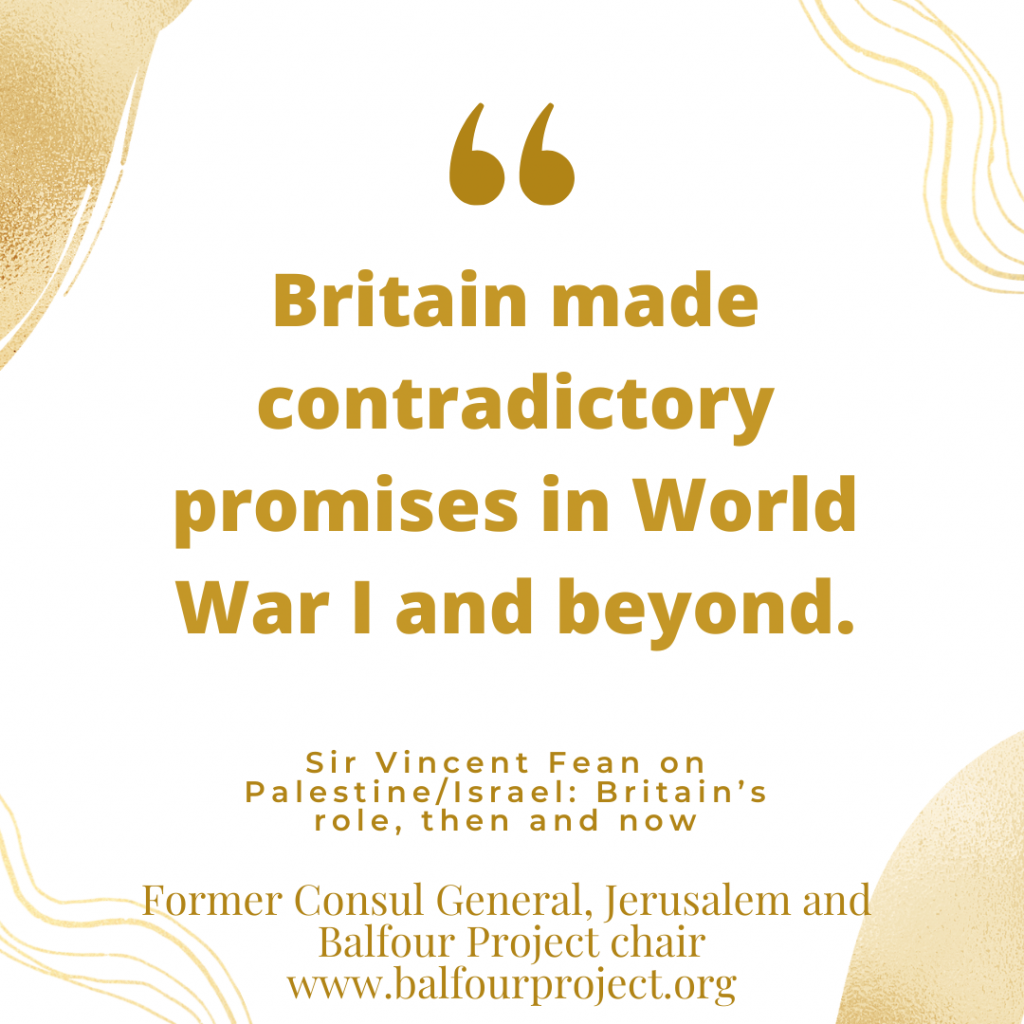
Some truly outlandish UK voting in the UN Human Rights Council. For example, in March of this year, refusing to condemn Israeli settlements on a technicality while affirming that UK policy is unchanged.
Voting against holding the UN Commission of Inquiry into the causes of the fighting in Gaza, Israel and Jerusalem in May.
On the plus side, there is a good, honest, focused Consul-General in Jerusalem, Diane Corner. She is concerned about evictions in Sheikh Jarrah, demolitions in SIlwan, and the repeated destruction of the village of Humsa al-Baqai’a. Diane goes to these hotspots and reports from the ground. The truth reaches Whitehall. It’s what happens then, or rather doesn’t happen then, that is of concern – and where lobbying of MPs and nagging of our Government can and do help.
I understand well the argument that it is right currently not to write off this new Israeli Government, something of a patchwork quilt. But equally, Prime Minister Bennett needs to know that breaking the law, which is what settlement construction is, has consequences. He needs to hear that from Britain, and I don’t think he is hearing about consequences from Britain.
I said that we don’t seek as a charity to tell other people, other countries what to do. Having said that, there are some things to address to the Palestinian political leadership as well as messages to the Israeli Government.
Foreign Secretary Dominic Raab got it right when first of all he deplored President Abbas’s decision to postpone elections. And secondly, he called for Israel to enable Palestinians in East Jerusalem to vote in Palestinian elections.
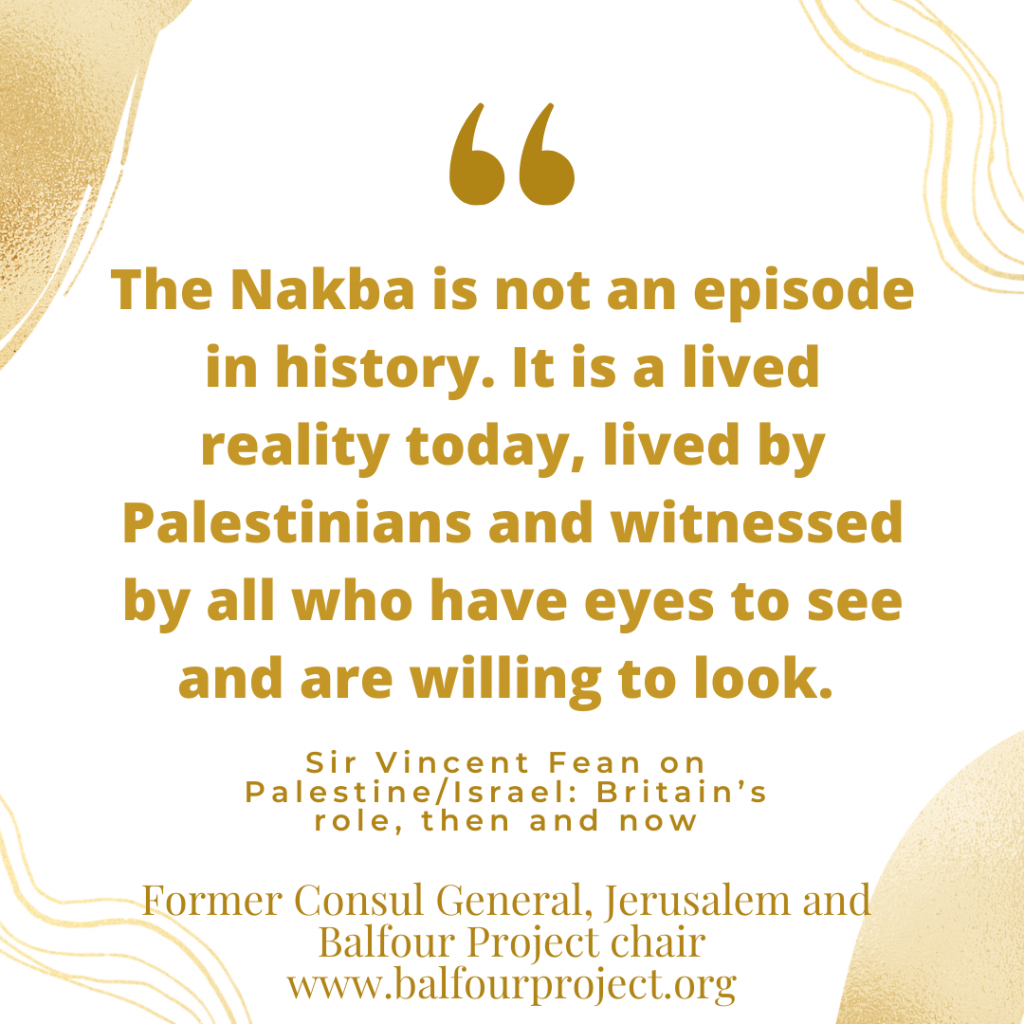
Britain has influence in Ramallah, arguably more influence in Ramallah than in Israel, and can use it to press for elections even if the USA and Israel and probably Jordan don’t want the elections. The UK should commit to work with whoever wins those elections.
The UK can also press for an end to Palestinian Authority harassment of political opponents, so that Nizar Banat did not die for nothing. I hope and trust that UK pressure is being exerted.
Before I talk about what we in civil society can do to influence UK Government policy to effect change on the ground, a few words about the role of the USA.
First, President Biden is better than Trump. That’s quite important. It’s important for the world.
Second, President Biden will not willingly prioritise ending the Occupation as against managing it.
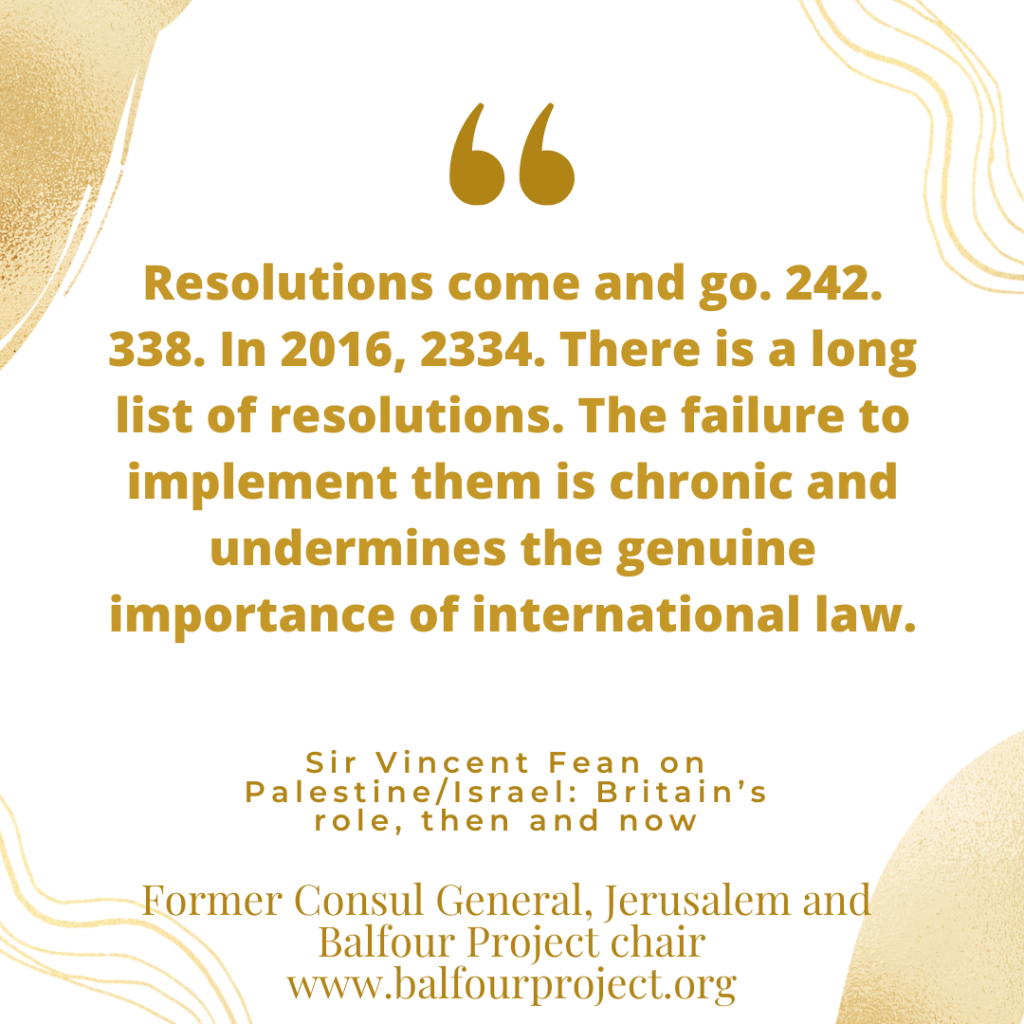
So, don’t buy the line that we have to wait for the Americans. We don’t have to and we shouldn’t. And we have to work where we are. And for Brits, that’s right here. I’m conscious that our audience is wide, in Europe and in the United States and elsewhere. We need to work where we are, and the Balfour Project does that.
What’s to be done, starting here?
What can we do, and where can you help if you’re minded to?
First of all, if you care, don’t give up. It’s what those who like the status quo want you to do. Don’t give them the pleasure.
Second, here in the UK we are a functioning if rather creaky parliamentary democracy. Lobby your MP. Get them to convey your thoughts to Ministers. It does matter. I’ve been told from inside the Foreign Office, now FCDO, the Foreign, Commonwealth and Development Office, that it does matter.
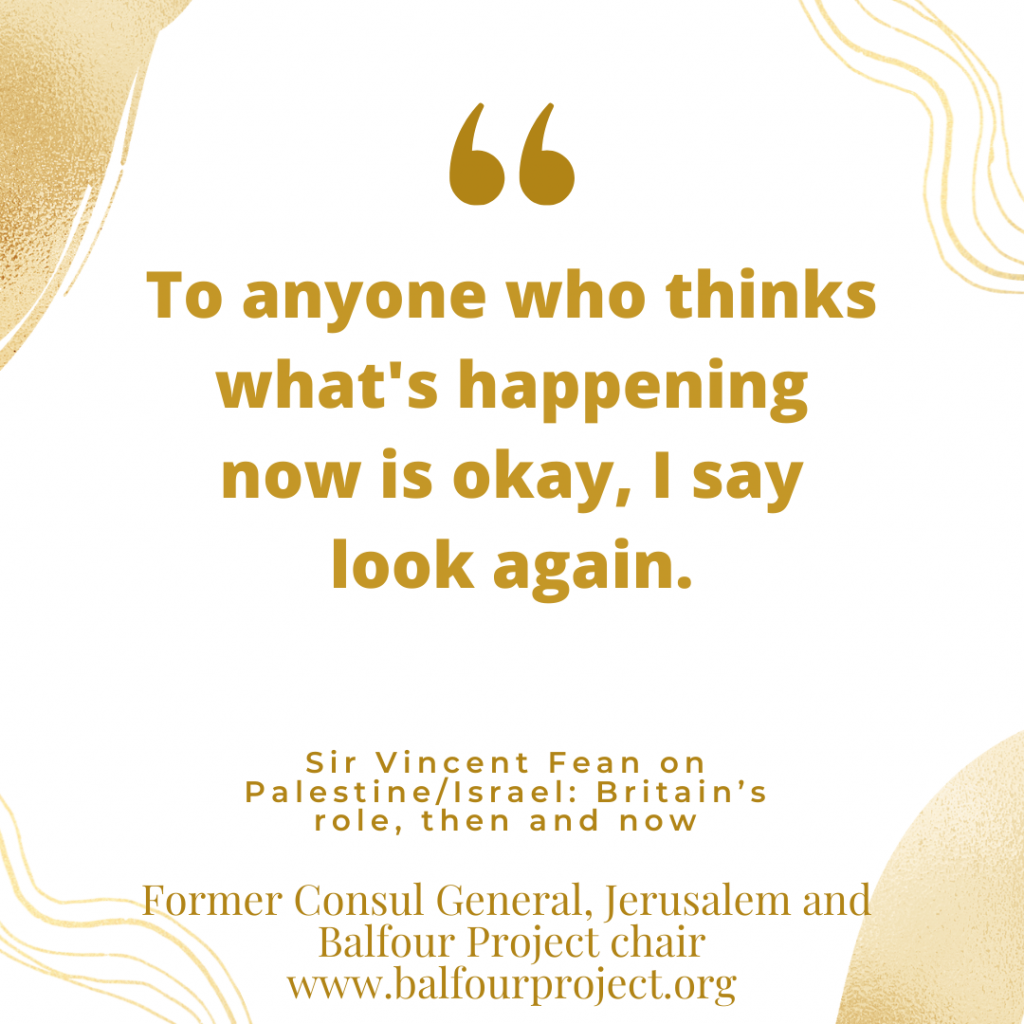
Our Government says that it respects international law. That, sadly, is an increasingly dubious assertion, given the recent declared intent to override international law in relation to the Northern Ireland Protocol, the Chagos Islands, and the independence of the ICC.
Nevertheless, this Government will continue to say it. So we can take the Government at its word and press it to uphold the law in deed, not just in word. That’s why the Balfour Project assembled some powerful legal and political minds to address the theme Israel/Palestine: In Search of the Rule of Law in May of this year. There’s also a booklet of essays by politicians and others, including Hannah Weisfeld of Yachad, about what’s wrong and what can be done to put things right. The highlights of the conference have been transcribed and will come to an email address near you soon.
The conference ended with the Balfour Project’s statement, of which we are proud, which has gone to Mr. Johnson and Mr. Raab under a letter from several MPs.
It’s very important that Ministers are made aware of your strength of feeling on these issues. The key point is equal rights, with mutual security for Israelis and Palestinians – not surface level, superficial security for one people at the expense of another. That’s not genuine security for anybody.
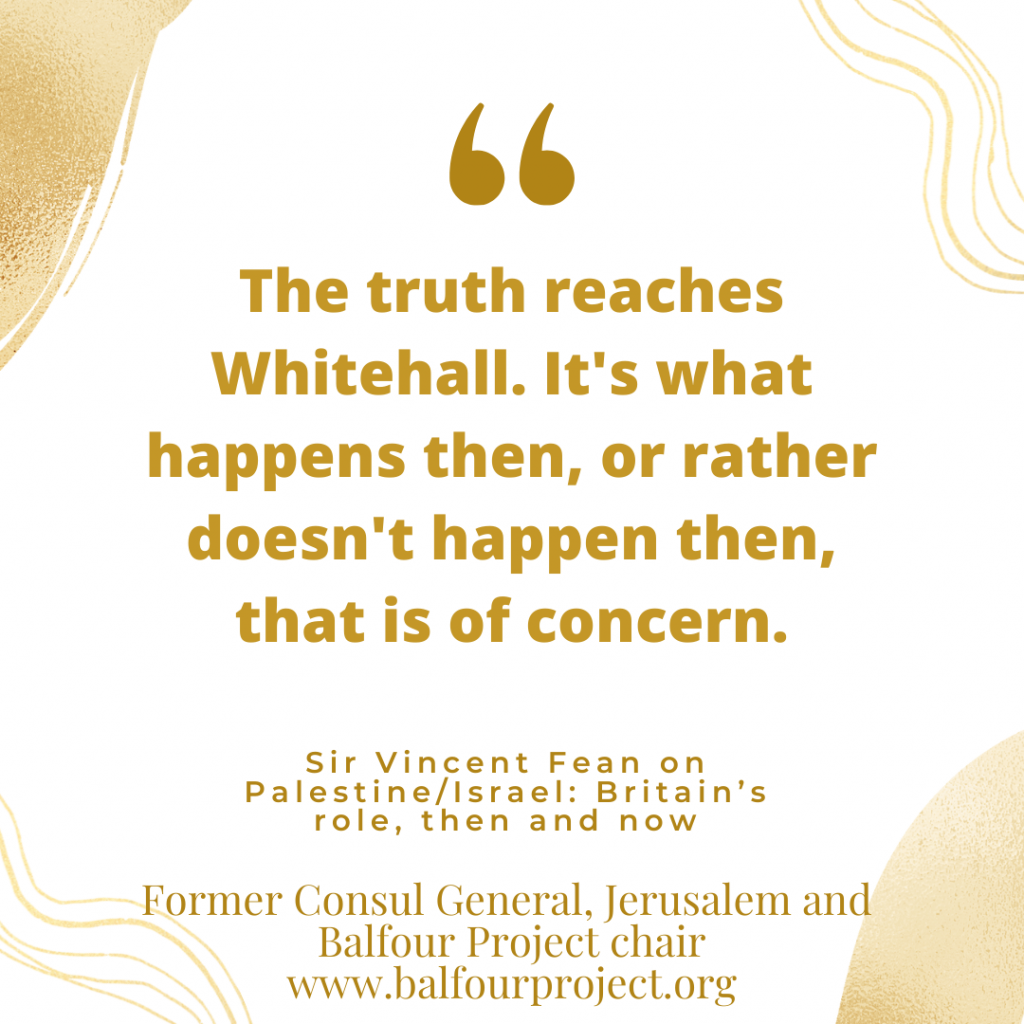
I’m glad to say that some good things have happened this year. Some examples:
The Irish Foreign Minister, Simon Coveney, has confirmed that the Israeli settlement project in East Jerusalem and the West Bank equals annexation. This matters because some European governments were preparing to respond last year to Netanyahu’s bid for formal annexation with consequences for such an illegal act.
Now, Ireland has confirmed that settlements equate to annexation. So, consequences should follow. Ideally, concerted among the like-minded countries of Europe.
It’s for politicians, not for charities, to determine what the consequences should be. But let me mention one option close to home. Last year, Shadow Foreign Secretary Lisa Nandy announced that if Mr. Netanyahu went ahead with formal annexation, Labour Party policy would change to favour a ban on importing settlement products. Now, Ireland has stated that settlement equals annexation, which is true. Will Labour concur and introduce its policy change?
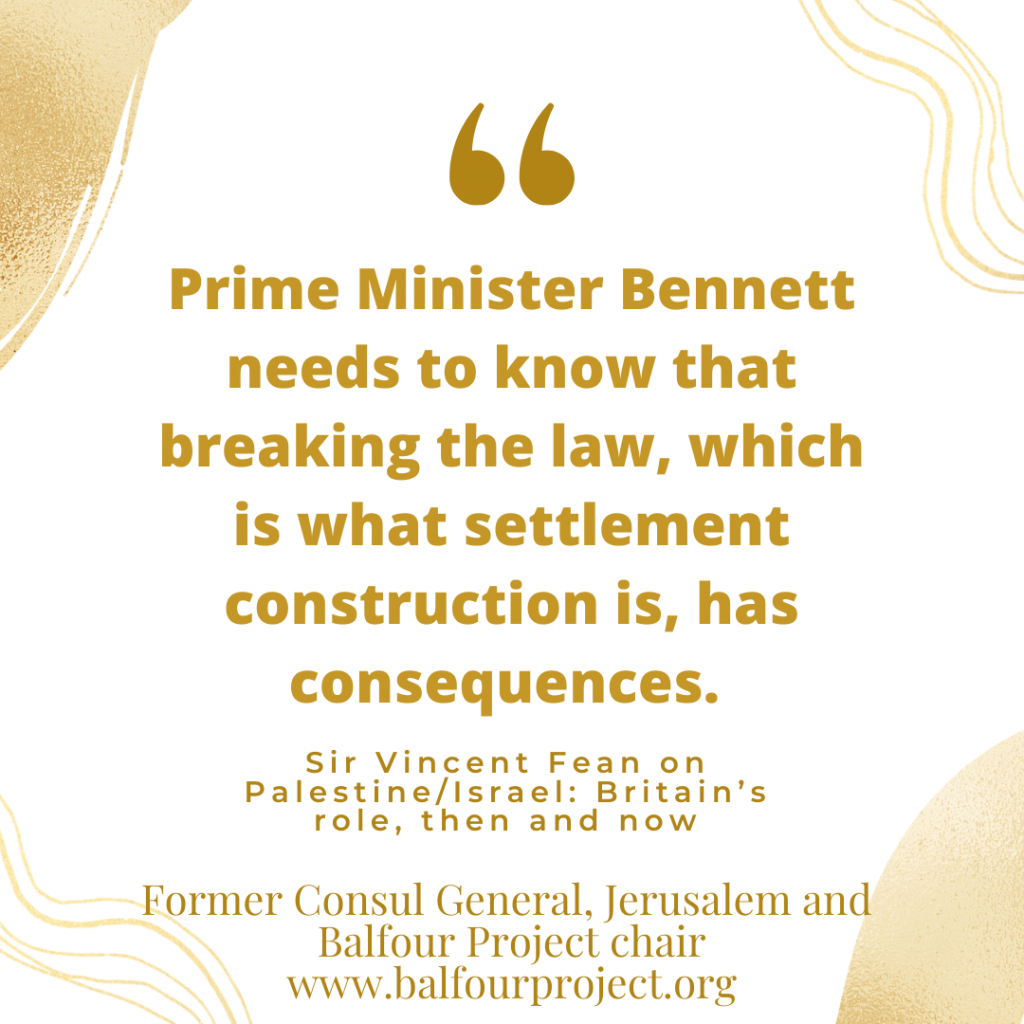
Another good thing happened: the Jerusalem Declaration on Anti-Semitism, signed by eminent Jewish lawyers and academics. It is a clearer, more precise definition than the one put together by the International Holocaust Remembrance Alliance, the IHRA, which should never be used for regulatory purposes, and should never have been put to that use. The Balfour Project strongly commends the Jerusalem Declaration on Anti-Semitism.
Apartheid. An awful practice, but it is good to call things by their name. In March 2017, Boris Johnson, then Foreign Secretary, told the truth. He told Mr. Netanyahu: ‘You either have a two-state solution or some kind of apartheid system’. Well, we don’t have a two-state solution today.
Michael Sfard, B’Tselem and Human Rights Watch have all concluded that apartheid is being conducted in the Occupied Palestinian Territory. Other highly-reputable NGOs will report later this year. It’s important – and the Balfour Project charity wants to draw your attention to what’s important.
Education
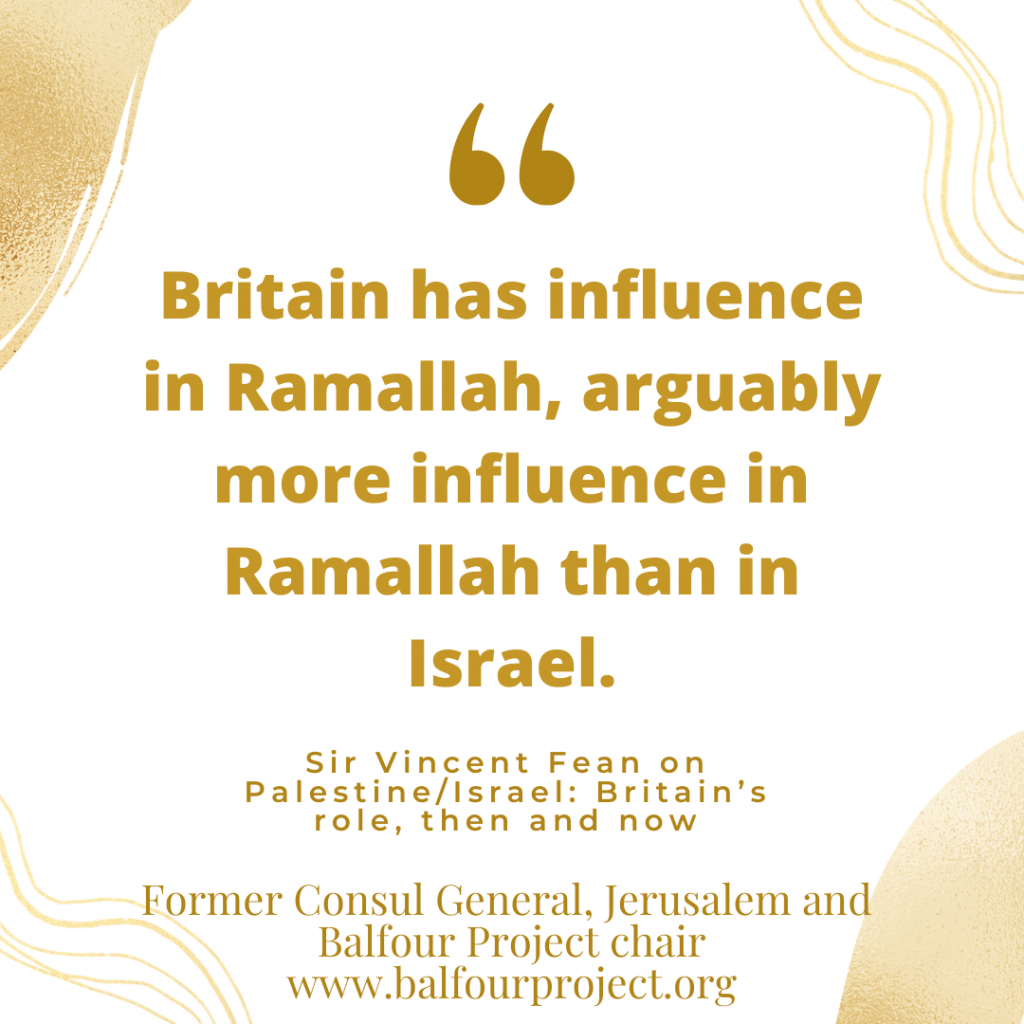
Education, raising awareness here in Europe and around the world, is important. The Balfour Project seeks to increase awareness of the facts and of Britain’s role in creating them. To that end, in this last academic year, we recruited and funded 14 postgraduate students in UK universities as Balfour Project Peace Advocacy Fellows, working to further the aims of the charity.
Last year during the lockdowns it was through project work. For example, analysing the impact on campus of the IHRA definition of Antisemitism. That unique and rich analysis will be on our website soon with three other projects by Fellows. An art project, “Mapping Palestine”, is already there.
For the 2021/22 academic year, we aim to recruit up to 20 Peace Advocacy Fellows, undergraduates and postgraduates. That’s more ambitious, and more expensive, but worth the effort and the cost.
Secondary school education matters. Israel/Palestine is taught in too few secondary schools in our country. It’s a key part of Britain’s imperial / colonial past, though not a glorious part. To understand the present, you need to know how we got here and what was done in our name.
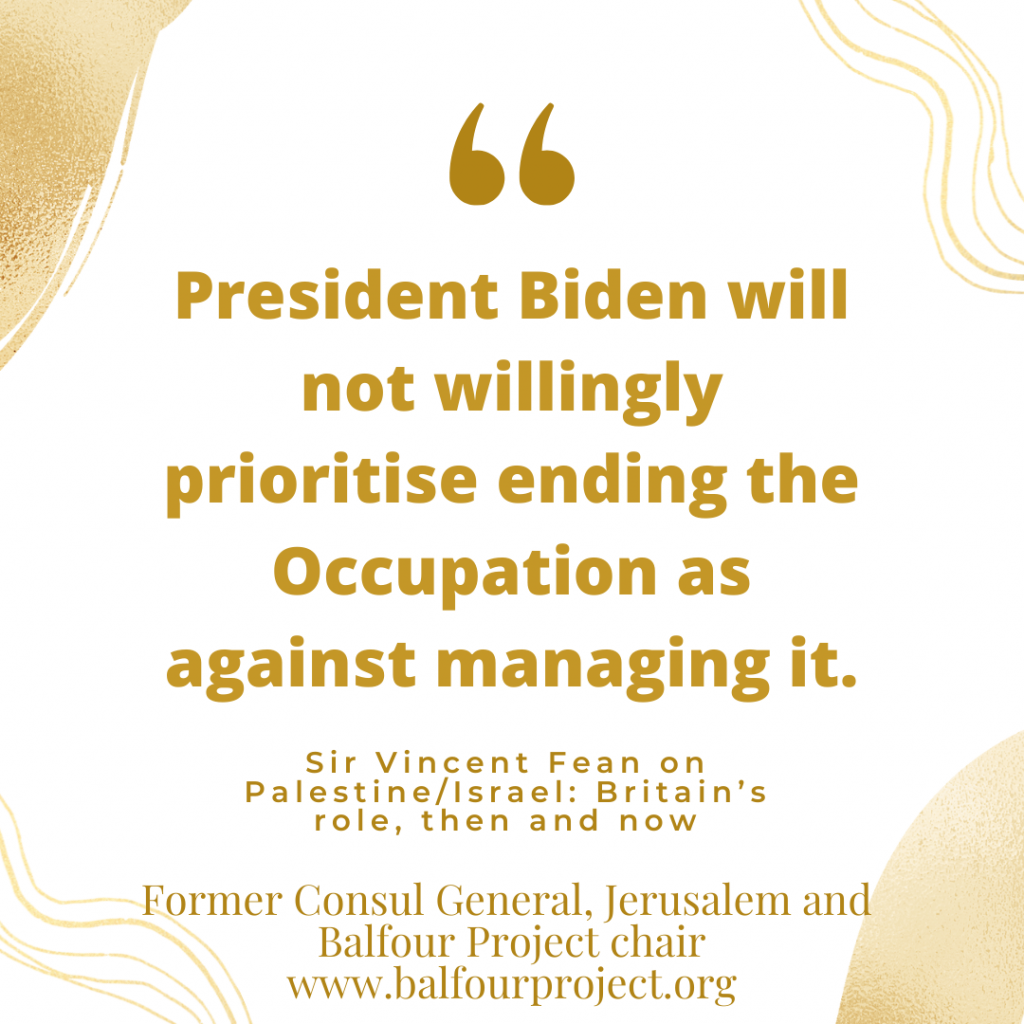
You may know of the Pearson debacle, when a decent secondary school history textbook was subjected to 300 amendments by UK Lawyers for Israel, then withdrawn by Pearson.
How can we ensure objectivity as we seek to increase the take-up of study in schools?
The Balfour Project will talk to teachers and wants to hear from teachers and heads as well as the National Education Union and other experts.
Parliament
Parliament matters. This issue is entirely political, so our national parliaments, Westminster, Holyrood, across Europe, the European Parliament, the US Congress, all matter.
Lobbying your elected representative matters, as I’ve said.
Governmental inertia is only disturbed and changed by debate, persuasion, making a noise, making a difference through reasoned argument.
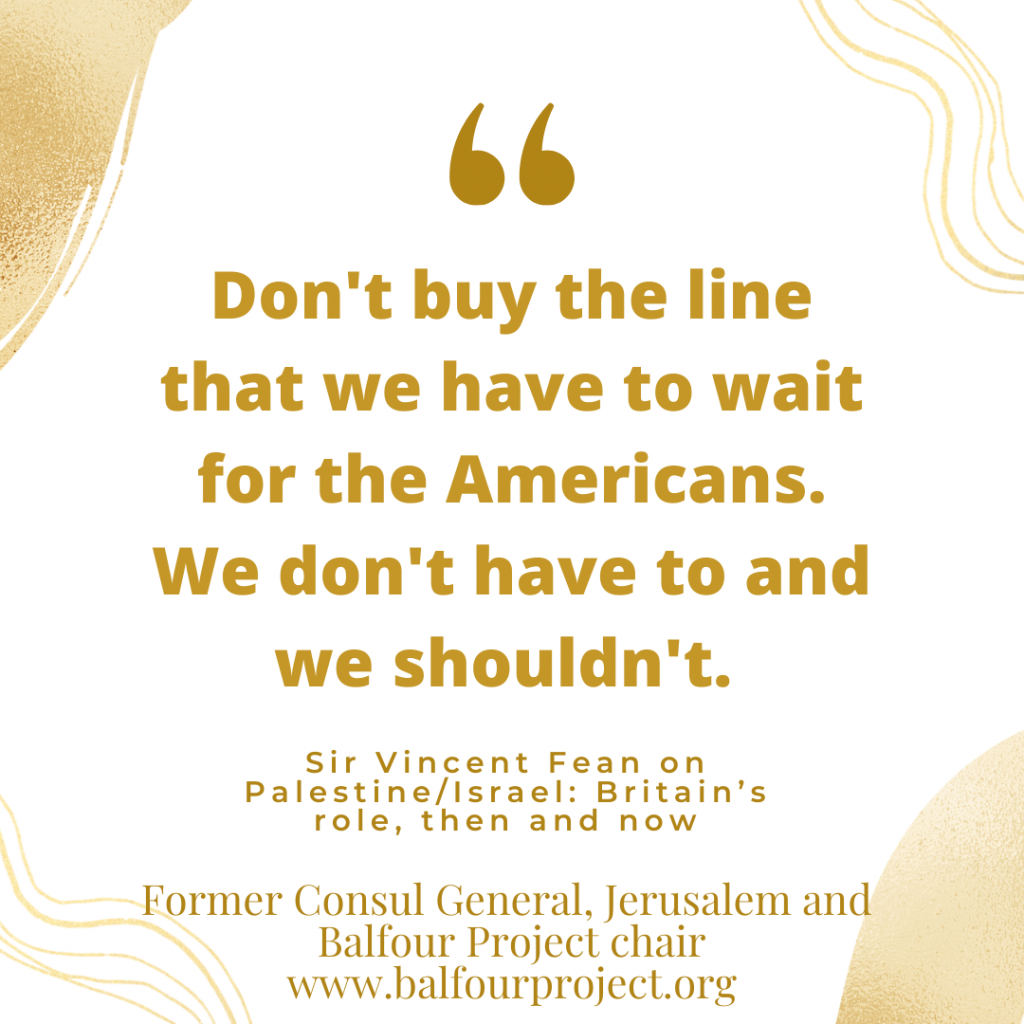
The Balfour Project tries to do that, along with others. For example, CAABU, the Council for Advancement of Arab – British Understanding, and MAP, Medical Aid for Palestinians, to name but two.
The Balfour Project works closely with UK Parliamentarians on a cross-party basis on Parliamentary activity in the Lords and the Commons. The charity is also the secretariat for the growing network of European Parliamentarians for Israeli – Palestinian Equality. MPs from 14 European national Parliaments and the European Parliament, with the same aim: equal rights for Israelis and Palestinians. I think that network needs to grow in number and importance, and it will.
I find the argument in favour of that aim, equal rights for Israelis and Palestinians, simply unanswerable. Who can contend that equal rights are wrong? It’s a nonsense. It doesn’t make sense. That’s why it’s right to seek change for the common good, including our own.
I have tried to summarise the aims of the charity in education and related advocacy, touch on the UK’s historic role which gives us a responsibility to work for equal rights, describe what is happening now for good and ill, suggesting some ways in which we can seek to influence our political decision makers now, and to enhance the knowledge of young people who, as the true saying goes, are the future.
Funding the Balfour Project
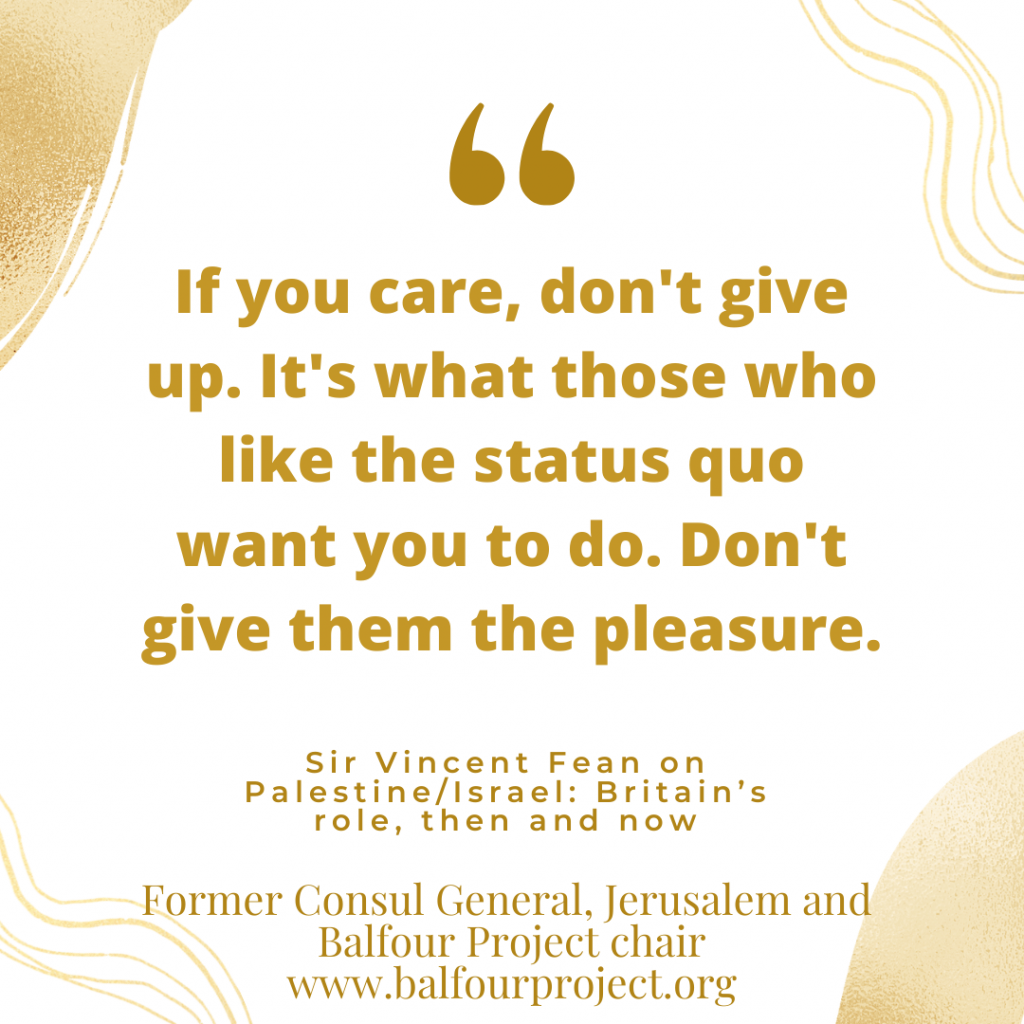
I look forward to your questions. I’ll end simply by saying that the Balfour Project tries to do good. I know we do no harm. We try to do good. If what you’ve heard today or seen on our website finds an echo with you, please find a way to donate to the charity. We seek regular giving, or one-off giving. We seek giving! I’ll come back to that at the end.
Questions
Diana Safieh:
I want to read a lovely comment from Maliha. ‘As a year 13 student, I feel empowered after your talk. Thank you. What advice would you give us for approach in schools?’
Sir Vincent:
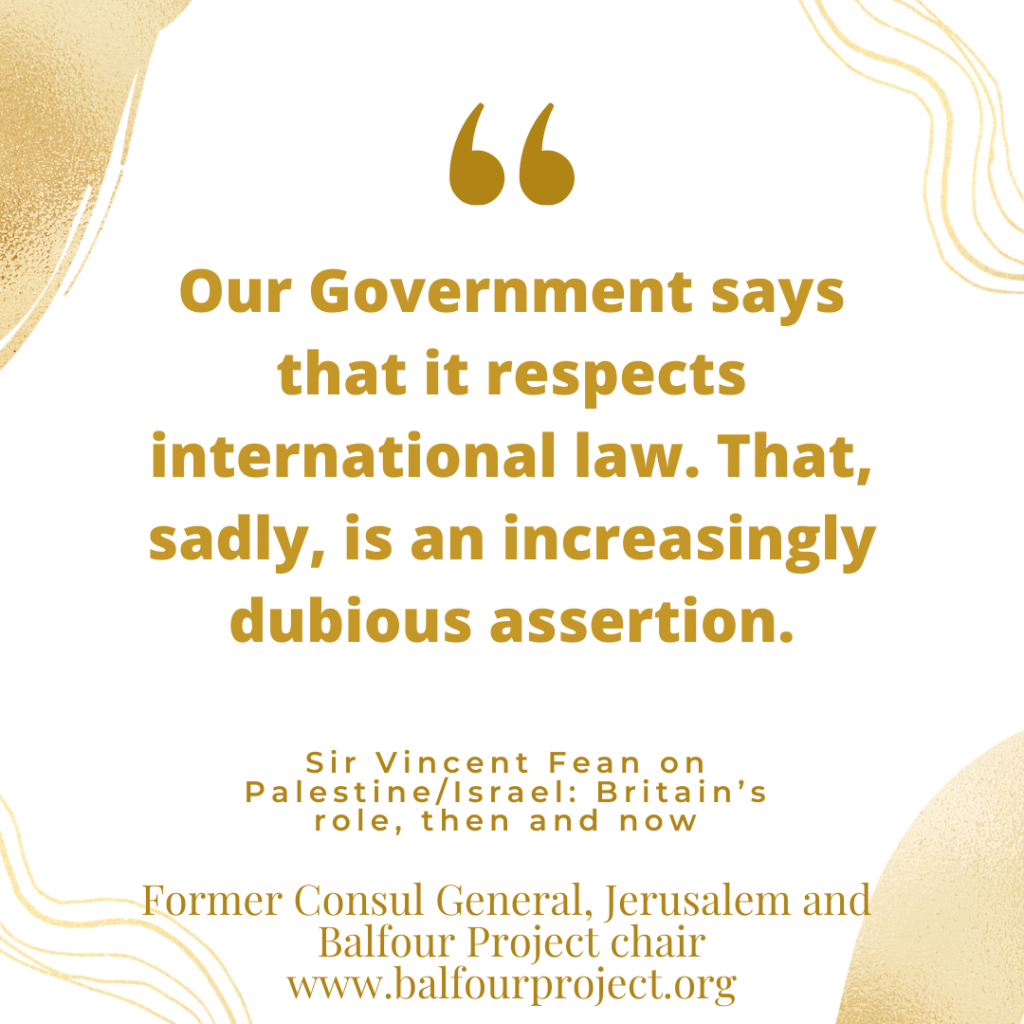
It is important to portray this issue for what it is: an issue of equal rights. In my opinion, it’s not a religious issue, it’s a political issue where Britain has a particular responsibility from the past and a role for the future, because it is not likely, it is not probable that the peoples of the region are going to resolve this issue alone. Leaving it to the people, which is sometimes said, is ignoring the asymmetry of this issue. The power lies with one people through their government and armed forces, and the people that have suffered. Everybody’s suffered, but the people who have suffered through the Nakba and beyond are not empowered.
Coming back to the question how to address it in schools. I think the right thing to do is to talk to the teacher. If there’s a teacher on history or politics, talk. Ask the question, ‘Is it a subject that could be discussed in a forum, in class?’.
I wouldn’t set the framework for that. I think it’s an issue for the school itself to handle. I would take step first: talk to a responsible teacher, make the suggestion that there could be a debate, there could be a talk. The Balfour Project was prepared before the lockdowns to visit schools and to talk. There are others who do that. Solutions Not Sides, One Voice, others. CAABU does educational outreach as well.
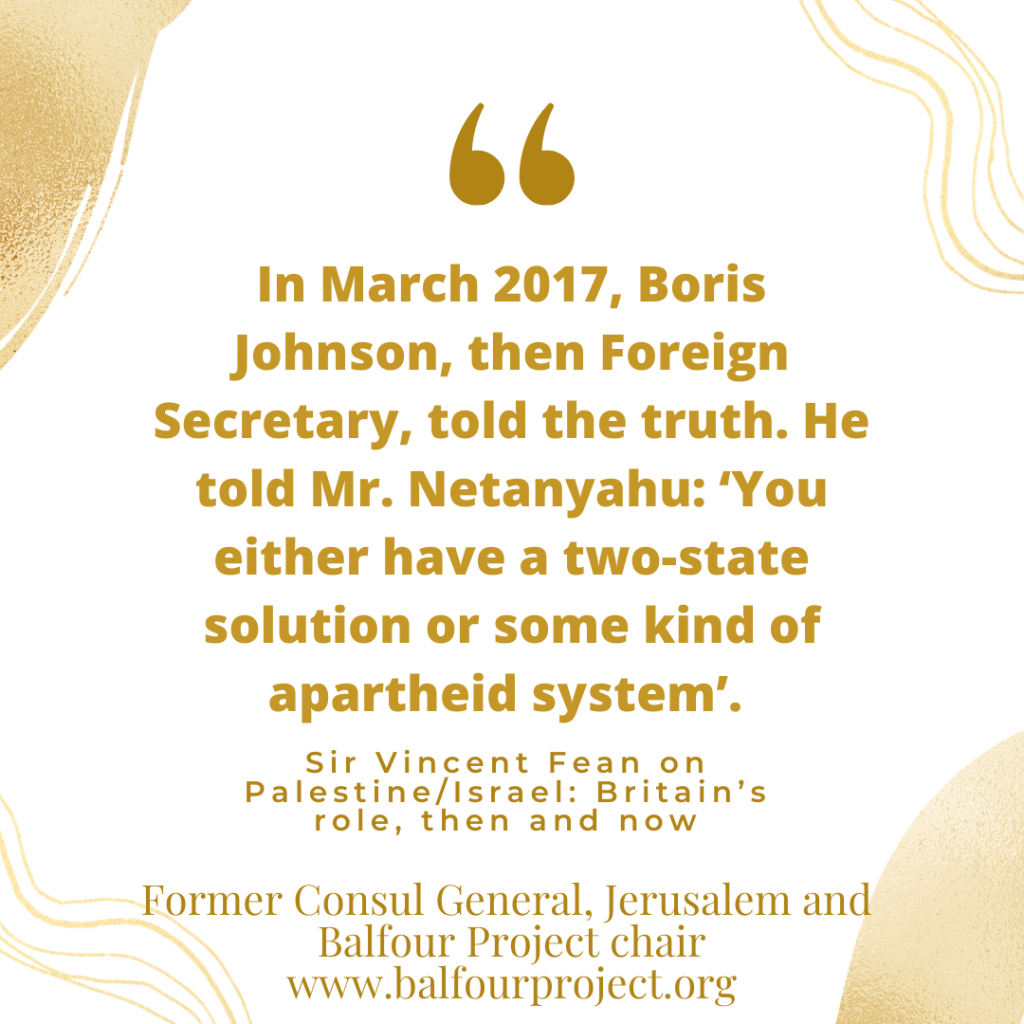
Perhaps my last remark on this good question, there are resources available. Our own website of the Balfour Project contains academic resources. There is Parallel Histories, which is a very well-organised teaching method founded by Michael Davies, which tries to tell both narratives. I’ll say here, both narratives are valid, because they are truly held by the people who believe them. I hope that gives you some ideas, Maliha, and if you need more drop us a line.
Diana:
We have a question from Claire Walford about what subjects this issue would be taught under. As you said, geography, history, politics. We have heard from a lot of our teacher supporters that they want to address this subject, but it can be quite daunting. It’s quite controversial. They’re worried about covering it appropriately. As you said, we have lots of resources on our website, including all of the past recordings from our webinar series and a couple of films on there as well. Please do check that out if you are a teacher who is looking to address this topic and want some resources.
We’ve got a lovely comment from Swee Ang, one of the founders of Medical Aid for Palestinians. She says thank you to us. ‘Today’s webinar is especially focused and positive and gives us a possible way forward, so we will go forward with you.’ Thanks, Swee.
There’s a really interesting question from Baroness Molly Meacher. She asks, as a cross bench Peer, what can she most usefully do?
Sir Vincent:
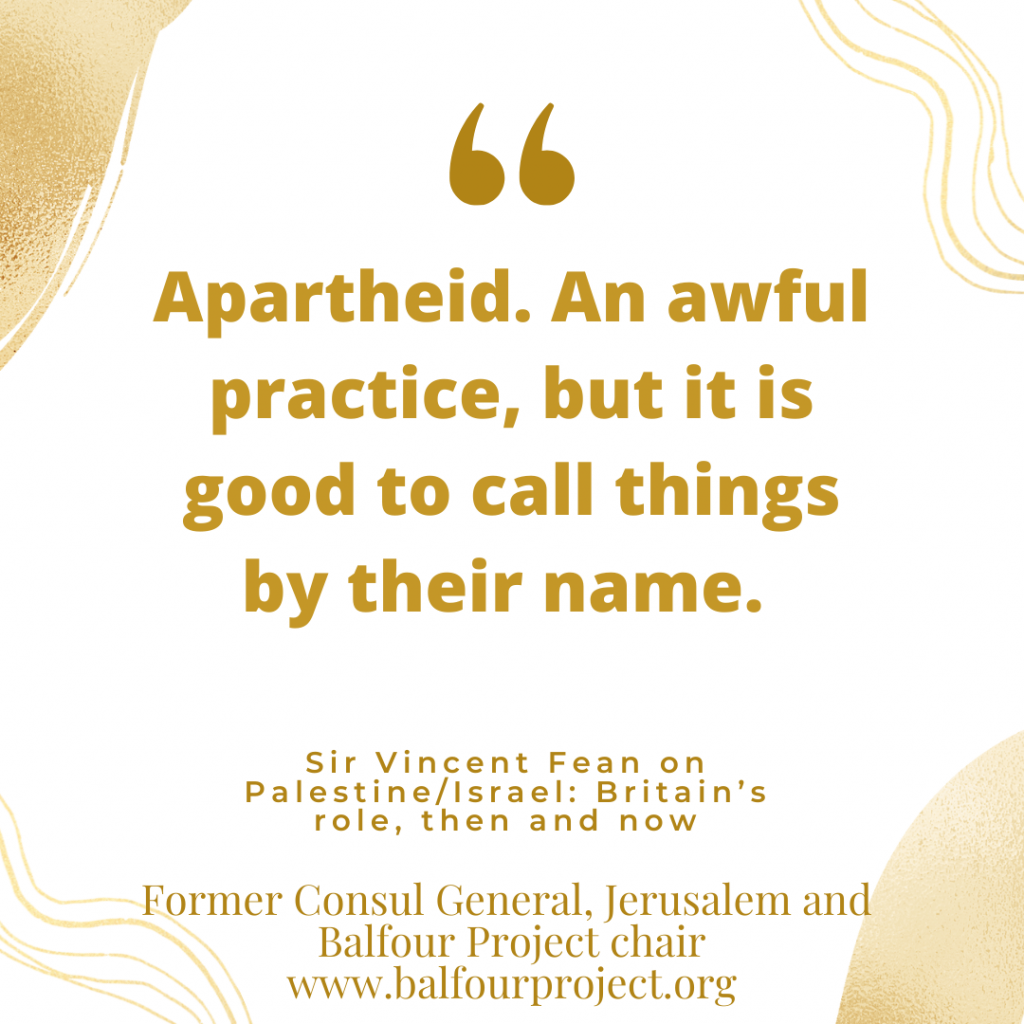
I said several times that Parliament matters, and Baroness Meacher certainly matters. What does Parliament do? In circumstances where the Government is not taking its responsibilities fully, then Parliamentary questions and debates put Government policy through the wringer. Debates have been few since the lockdowns because of the extraordinary situation of online parliament with few people in the chamber.
In September/October, I hope there will be a debate in the House of Commons on the question of recognition. Recognition of the state of Palestine alongside Israel. Britain recognised Israel in 1950. Britain believes in the two-state solution but doesn’t believe in recognising the second state, the other state in that solution. I find that aberrant.
Coming back to Baroness Meacher’s question: it’s quite important to work with others. I’m sure you do. But to work with people like Baroness Blackstone, Lord Falconer, others in the House of Lords. And it’s possible for the House of Lords to be more reflective than the Commons. There’s a lot of expertise in the House of Lords. It can feel like an uphill struggle, and let’s face it, it is. If the Government is set on a particular course, diverting it by debates is hard. But it’s the Parliamentary way, it’s the democratic way. Persuasion, knowledge, reasoned argument and persistence are all needed. And I’m pretty sure Baroness Meacher’s got them all.
Diana:
Saleha Rahal asks: “US President Biden has maintained the US Embassy in Jerusalem, Al Quds. How was Biden advocating a sustainable resolution to the Palestine quest for self-determination and a just peace?”
Sir Vincent:
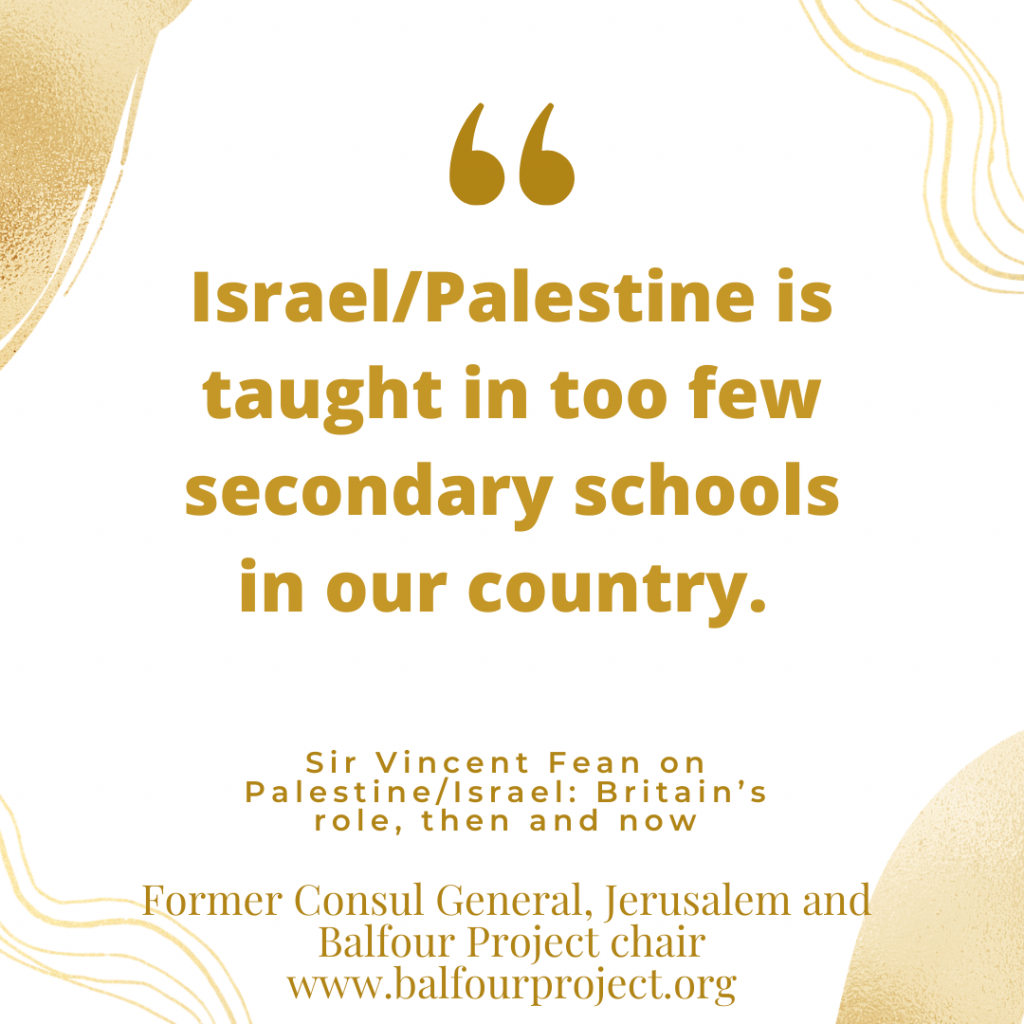
I think it’s fair to say, and I try to say it, that President Biden is not the answer to our prayers, but he is the answer to the prayers of the world in removing, democratically, President Trump.
On this issue, the instincts of the US Administration will be managerial. They will be to choose their ground for discussion, choose their issues for argument. There will be a big argument with Israel about Iran and nuclear weapons. And there is, as we all know, a strong pro-Israel lobby, called the Republican Party these days, and also the lobby on the Hill.
So, what to expect? Well, I think our expectations should be low but our asks should be high. The expectations of success, or rapid movement by the Biden Administration should be low. But using the words of the Administration, Tony Blinken has talked about equal measures of liberty and prosperity for Israelis and Palestinians. How is the US Administration going to realise that hope, that aspiration? How is it going to make it real? Questioning the Administration is important. Public diplomacy is important. I am impressed by maybe small straws in the wind – eg The New York Times showing photos of women, children, old men dead in Gaza, after the May fighting.
I think that in America there is a growing awareness, among those who want to be aware, of the inequity of the situation. That can be built on.
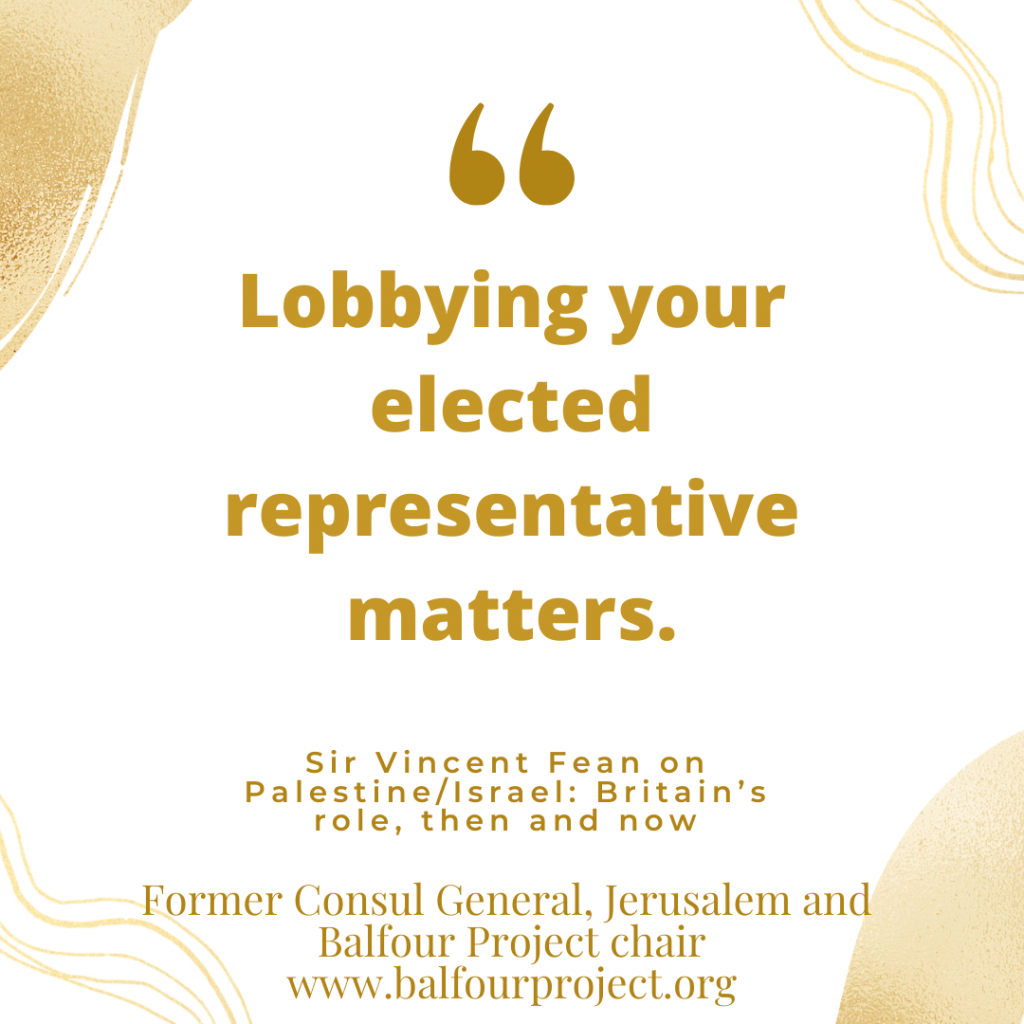
So, I’m hopeful. But I’m not hopeful of a radical change by the Biden Administration in its coming three years. If anything, radical thinking should come more from Europe and the US be brought onboard. That’s also an aspiration rather than a certainty.
There are small flickers of hope in Europe, in Ireland, in Belgium and elsewhere, that this issue is coming back into focus, back into the limelight, because leaving it in the dark just leaves it to fester and that can’t be allowed.
Diana:
We’ve got a question from Ralph Cairns. ‘What does Sir Vincent think that the British Government could have done differently, once the British Mandate had begun, to promote fairness and justice for all in Palestine and Israel?’
Sir Vincent:
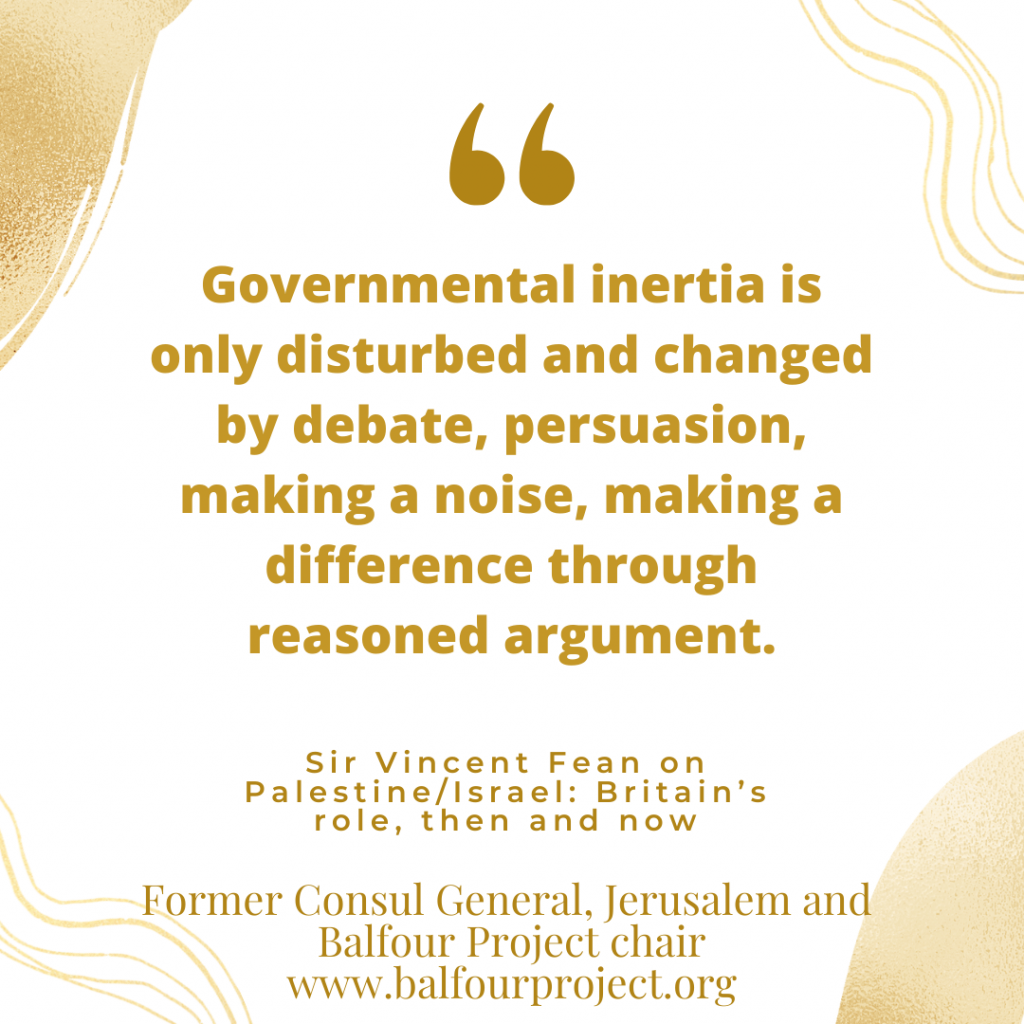
Thank you. Ralph is a guiding light in the British Palestine Police Association, which I respect. Now, what could we have done? Well, hindsight’s a glorious thing. What I would say is that the reality of what we did between 1917 and 1948 was to, as Sir Martin Gilbert has said, keep back the majority in order to maintain the Balfour Declaration, which was for a minority, which is not democratic. That era was not particularly democratic, and our imperial era was not democratic. Britain paid very little heed to the wishes of the majority in its colonies. Now, Palestine wasn’t quite a colony but it was a Mandate territory and we had power. What could we have done differently? It is an intrinsically difficult problem. There would always have been spoilers, as today there are spoilers on both sides, on the Palestinian side and on the Israeli side, who don’t want peace. But I think that if we had operated on the basis of equality, of equal rights, of equal opportunity, we would have been in a better place and, I think we had to leave, but we would have left a better situation.
Diana:
Gianpetro Vallorsa asks: ‘What are the main points of the critics of the Jerusalem Declaration on Anti-Semitism, and what are the changes between that one and the IHRA definition?’
Sir Vincent:
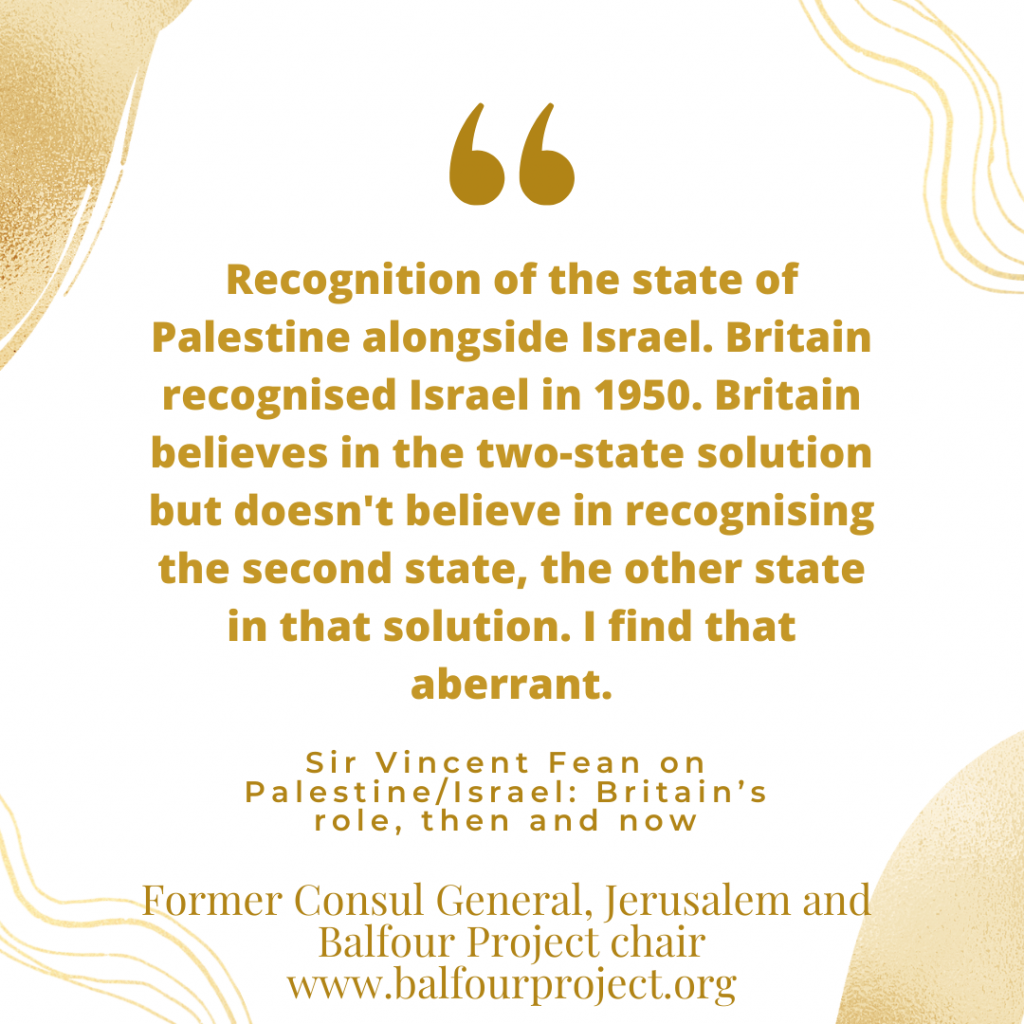
I haven’t heard much criticism of the Jerusalem Declaration on Antisemitism, except that it came second chronologically. The IHRA definition came first. I recall that the author of that definition made it clear that it was not intended to have any regulatory function. But it’s been taken that way by several US states, and up to a point by our own Secretary of State for Education, in holding it as a term of law almost. The IHRA definition is vague, and I don’t think it should be used for any legal or financial or other regulatory purpose.
The Jerusalem Declaration on Anti-Semitism (JDA) has the merit of clarity. It’s more precise. To give you one example, the Balfour Project does not take a position on boycott, divestment and sanctions (BDS). You will find that charities do not, and we are a charity: we do not. But the Jerusalem Declaration on Antisemitism does take a position, and it says, in and of itself, BDS is not anti-Semitic. That’s an example.
The people who signed up to the JDA impress me. I don’t know the full range of Jewish legal minds, but Philippe Sands has signed, and Brian Klug has helped to present the Jerusalem Declaration to the EU Commission, which is currently thinking about its policy on anti-Semitism, and that policy has been largely based on the IHRA definition. The request to the Commission is, ‘Please take into account this newer, more precise definition when you’re thinking about policy guidelines, because to think in the old way is to think in a way that is vague and is capable of subjective interpretation. And we don’t need subjectivity in this sensitive area’.
Diana:
Martin Linton is a former Labour Battersea MP and also runs Travel to Palestine, which brings delegations over to the area to be able to see what’s actually happening on the ground. He says, ‘As a former Consul General, can you tell us what the Consulate-General can do to stop the evictions in Sheikh Jarrah? And without revealing personal details, can you tell us anything about the locally-employed staff at the Consulate General in Sheikh Jarrah who are threatened, or their families are threatened, with eviction, bullying and harassment by settlers?’
Sir Vincent:
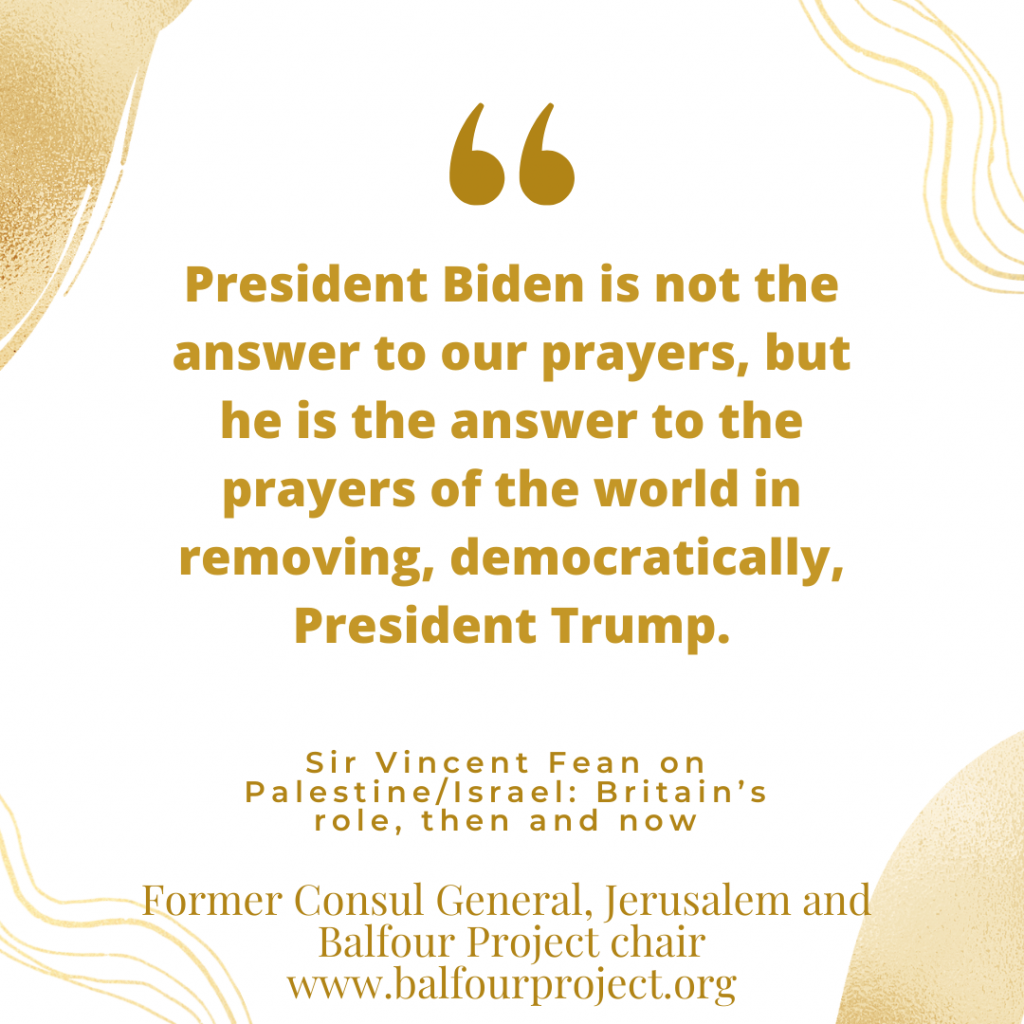
The Consulate-General is based in Sheikh Jarrah. There is a settlement, it used to be called the Shepherd Hotel, a hundred yards from the office building and the residence of the Consul-General, which are co-located. So, Sheikh Jarrah is a theatre of the settlement activity and the settlement resistance. It’s worth remembering that Jerusalem is in legal terms separate, a corpus separatum, and that East Jerusalem is occupied territory.
What the Consul-General can do is to draw attention to the situation. That’s happening. Phillip Hall, the previous Consul-General, has visited villages which are being bulldozed by the IDF, and has given video interviews from the site. Diane Corner, the current Consul-General, a recent arrival, has done likewise.
What does that show? It shows a good thing, which is that the British Government, which authorises these activities, is willing to send its representatives to the field to show our Government’s disapproval of what’s going on, our condemnation of what’s going on in terms of evictions, demolitions, and settlement expansion.
It is harder is to see the linkage between that demonstration of disapproval and action to prevent a recurrence.
I was Consul-General between 2010 and 2014. In 2012, either William Hague as Foreign Secretary or Alistair Burt as Minister of State for the Middle East condemned settlement expansion plans I think 20 times at least in that year. 20 times. The condemnations did not have teeth, and the condemnations did not work.
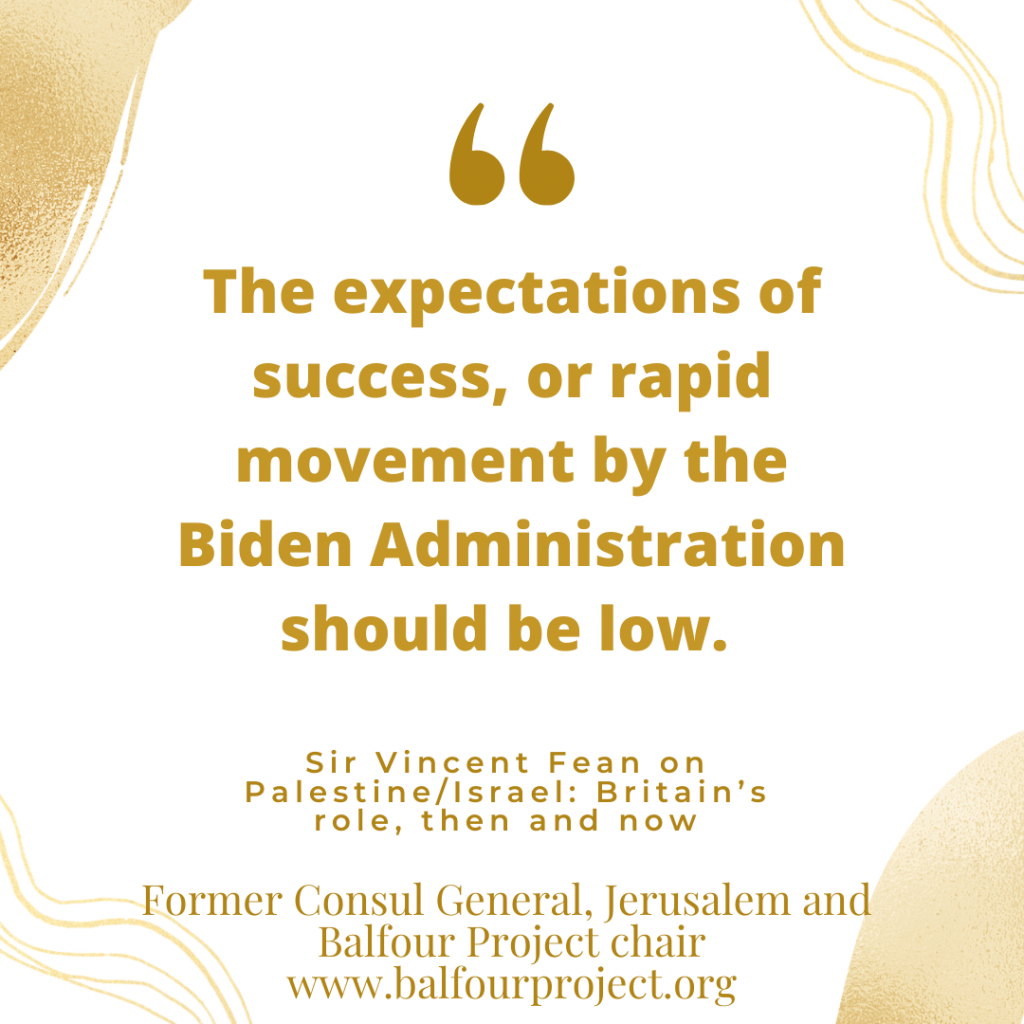
The Consul-General can and does tell the truth, report the facts, report developments, report what may come, so that the Whitehall machine, the Foreign Office and Number 10 are fully aware of the realities. Then you come back to the question: so what? So what does the Government do? It condemns. Give it credit for condemning. But it doesn’t act, and therefore the condemnations get repeated, the acts get repeated, the actions of settlement expansion etc, get repeated.
On the issue of local staff, I am aware from my time that local staff living in the West Bank and trying to get into Jerusalem to do their job, first of all they couldn’t drive in. If you have a car in the West Bank you can’t drive into Jerusalem, it’s not allowed. The only cars that move in Jerusalem are Israeli-registered cars. The ability of my staff in those days to get into work was heavily-dependent on the actions of the Israeli armed forces, on whether or not there was a sudden checkpoint, what they call a flying checkpoint. Roadside, two cars blocking the way – and queues. The daily life of the Consulate-General staff is comparable to the daily life of Palestinians in the West Bank, which is hard, permit-dependent, and subject to sudden and unexpected delay and change. It’s a hard life.
Diana:
We have a comment from Angus Rhodes: ‘Vincent sounds very statesmanlike, in a good way, and it’s a shame that you were not the one in charge at the time’. We’ve a question from Mahdi Eskarieh, who asks if we’re planning face-to-face events in the near future. For the foreseeable they are online, but Vincent, do you want to comment?
Sir Vincent:

Let me tell you what we have in mind. We are interested in the 2nd of November because it’s the anniversary of the Balfour Declaration that gives us our name. We are hoping that there can be an event in Parliament around then. We’re working on it. That’ll be primarily to engage Parliamentarians like Baroness Meacher and others, to enable them to come together and to exchange views. That’s one face-to-face event. It won’t be for the general public necessarily.
We have done such public events in the past. We did it in 2017 for the centenary of the Declaration. We had 1,200 people in Methodist Central Hall for that. I think we will get back to that, but more likely in 2022 rather than 2021.
We’re also interested in visiting universities and having face-to-face contact with students and academic staff. Maliha asked earlier about how to tackle the issue in schools. We would like to do more in terms of addressing sixth form colleges and those who want to hear our take, which is that the people of Israel deserve respect and the people of Palestine deserve equal respect. We come back to that question of equality.
Diana:
A question from Ian Tegner. ‘To what extent, if any, do you think the British Government recognises the special responsibility of the UK on which you place great emphasis?’
Sir Vincent:
Not enough. The occasional remark from Boris Johnson is about unfinished business. The unfinished business of the Balfour Declaration. He wrote an article in The Daily Telegraph in 2017 when he was Foreign Secretary which included that remark. I still enjoy playing back to him his remark about apartheid and the two-state solution. It’s important.
It’s quite hard for anybody to persuade politicians of 2021 to take responsibility for politicians of 1917 – 1948. There are many get-out clauses. There are many ways in which not to take that responsibility on. It’s part of the job of this charity to tell the truth, to say what Britain did and to try and say why Britain did it, making the link between what happened up to 1948 and what’s happening today, and to say Britain’s got a role to play in addressing the subject of equal rights for two peoples in one region.
There is not enough sense of responsibility at political level, so there’s more to do. What matters in my opinion is not so much apologies, as doing something better next. For my money, recognition of Palestine alongside the state of Israel is the next thing to do, a logical thing to do to recognise and to show esteem for the rights of the Palestinian people alongside the people of Israel, and in an ideal world in two states.
Diana:
We have had a couple of comments from Colin Morris. It’s fair to say he seems quite pessimistic about the chances of achieving any real change from actions such as writing to your MP. For example, he says, ‘Contacting UK Government or MPs results in bland, holding replies, and nothing changes.’ So perhaps we can end this talk on the best way forward. For everyone attending, what can we do to have any kind of impact on this?
Sir Vincent:
I said we’re a creaky democracy. We are a creaky democracy. I wouldn’t give up. I remember a delegation of Catholic Bishops visiting the region while I was Consul-General. They go every January, visit Gaza, visit the West Bank, to talk to the living stones of Christianity. The original Christians, if you like.
Now, one of the Bishops’ complaints was, ‘We’re not being listened to,’ to which my response was, ‘Shout louder.’ And that came out in a future communique of the same group in a subsequent year.
Now, it can be demoralising, it can be depressing to keep trying and not to see tangible results. I’m conscious of that. It’s a kind of reality.
I said earlier that what people want us to do who like the status quo is to get tired, go away, get fed up. We shouldn’t do that. There’s more to it than that, there’s more at stake than our interest. It’s more than that.
So, what can we do? There are a multitude of ways to be constructive. One is joining a friendship group or a twinning association linked to Palestine. Showing Palestinian people that there are people in the UK who respect them, who wish them well, and who are thinking, speaking, talking and actually giving them a voice in the UK. Actually enabling them to speak in the UK. That’s a key point too, that Palestinian voices should be heard here. And when flights resume, Palestinians should come here and speak for themselves. We shouldn’t speak for them, they should speak for themselves.
There are charities who do good. Medical Aid for Palestinians we’ve talked about with Swee and the current team – they are a force purely for good. They do no harm. They repair harm and they try and prevent harm, physical harm and mental harm.
Is there more to be done? That’s a matter of individual choice. There are a large, maybe too large, a number of organisations focused on the conflict, on the … I don’t like the word conflict anymore. On the situation in Israel/Palestine. They lack cohesion, so some effort is needed to increase the cohesion of those who think that change needs to come and who are in the UK or in Europe or in America. More cohesion among them is highly desirable.
One of our questioners who’s written to me is interested in the role of the churches, and I’ve written back to Marina in the US about that. The role of the churches is important. They are a moral force and they care, by definition, Christian churches, about the Holy Land, the home of Christ. So, their voice needs to be heard.
In the House of Lords, to come back to Baroness Meacher, it’s heard through Bishop of Southwark Christopher Chessun, one of our charity’s patrons, who asks questions which the Government finds difficult about recognition, about the equal rights of Israelis and Palestinians. That’s Parliamentary pressure that the Church of England can exercise.
But coming back to the key question, what can we do? Well, if I may end on a financial note. The things I have talked about, the Fellowships, the thoughts about education in schools, the activity with Parliamentarians in the U.K. and across Europe, the public activity that we hope to resume in 2022, the webinars that we do now. Some of them are free to air, like the webinars. The activity with the Fellows will cost us £40,000 or £50,000 in 2021/22. We will pay the Fellows a stipend and encourage them to be active on the basis of the Balfour Project principles in their campus. That programme of activity costs money.
If you are moved or impressed or even interested by what you’ve heard today, and what you see on the website, please think about a donation to the Balfour Project. We live and die by the goodwill of people like you, of our supporters, of our subscribers. With more money we can do more, make more noise, and we can try and make more of a difference educationally and in terms of advocacy. That’s what we want to do, if you’ll help us to do it.
Thank you.
Diana:
I would like to just say as a Palestinian myself, I’m incredibly proud to be working with the Balfour Project because I see how much the trustees and the executive committee and advisory forum work on getting not only different perspectives but also a strong Palestinian voice which is sometimes forgotten, or neglected.
Speaking of having the different perspectives, we’re really excited about our next talk with Hannah Weisfeld from Yachad on 2 September at 3 pm.
